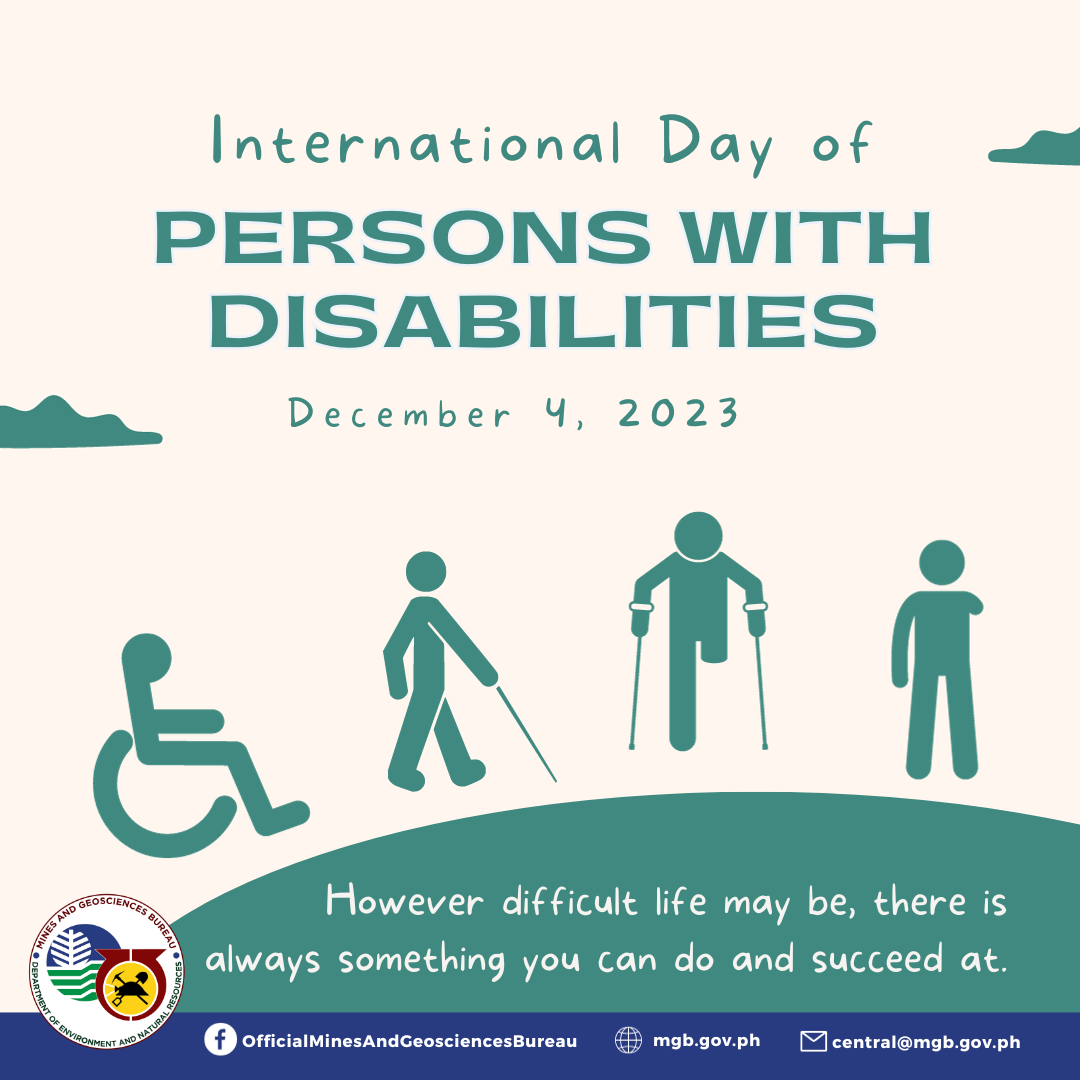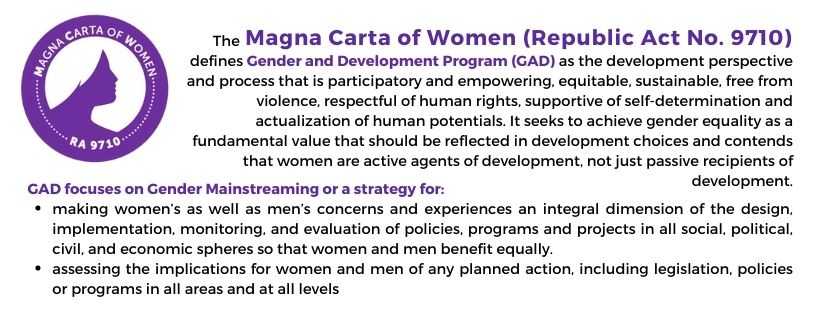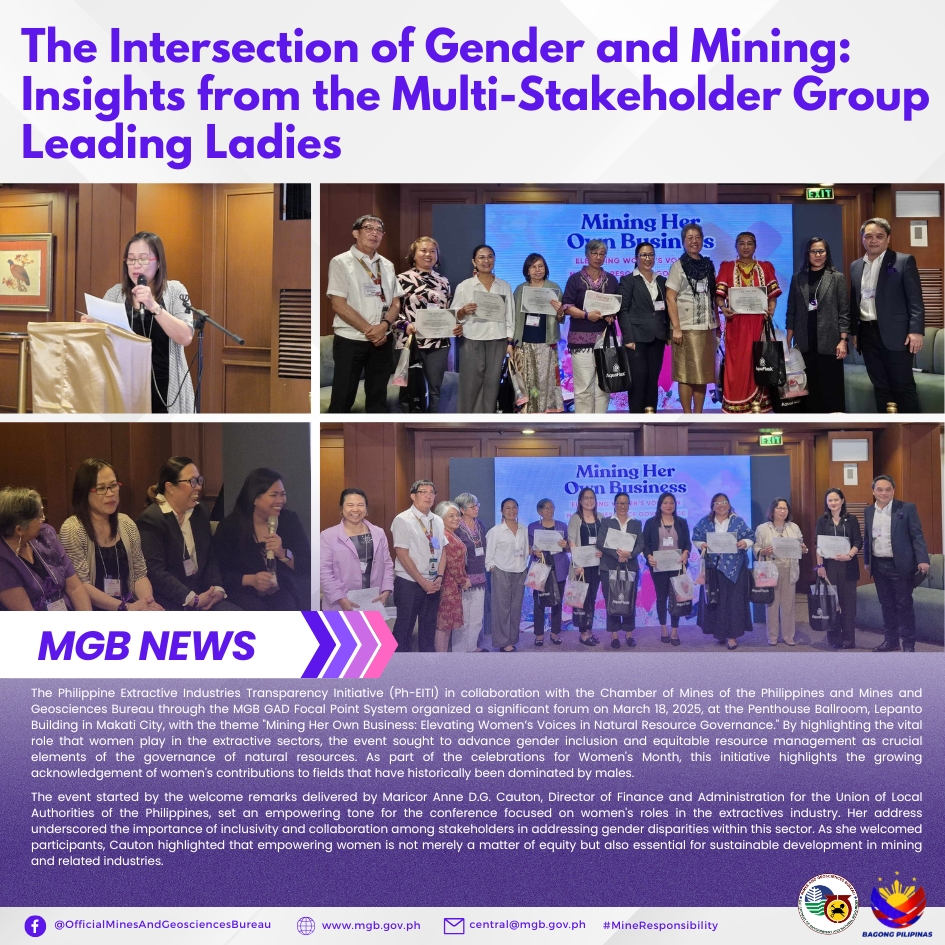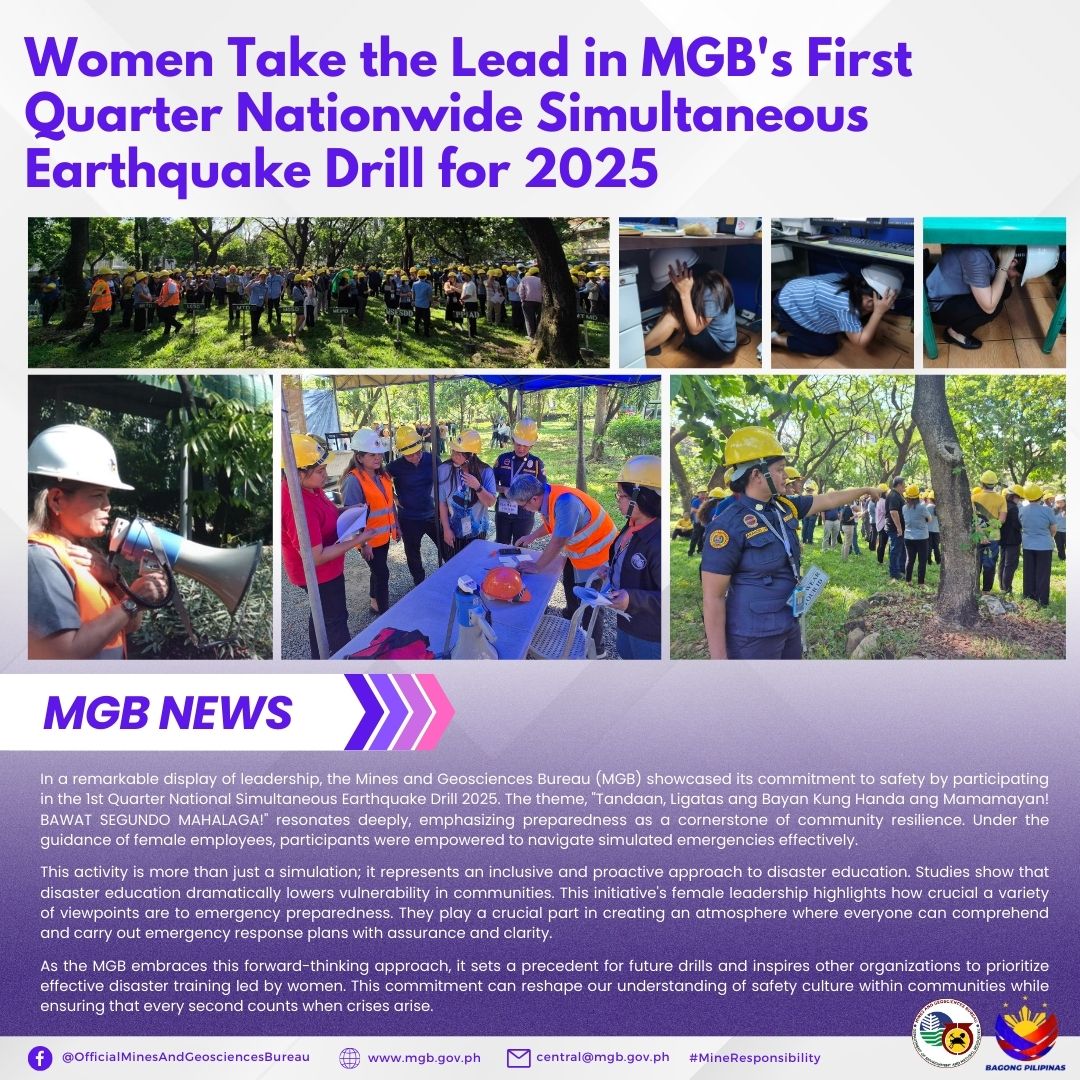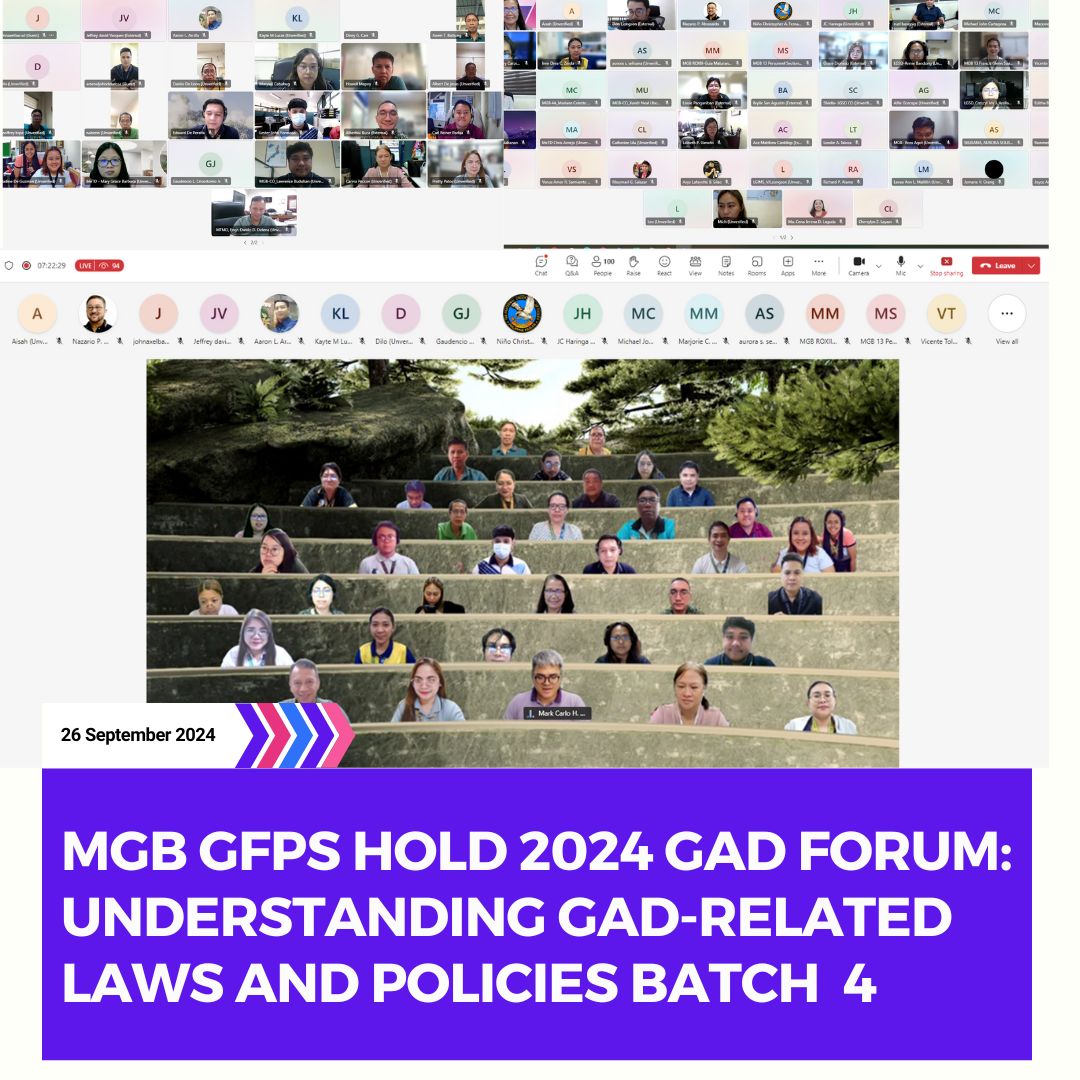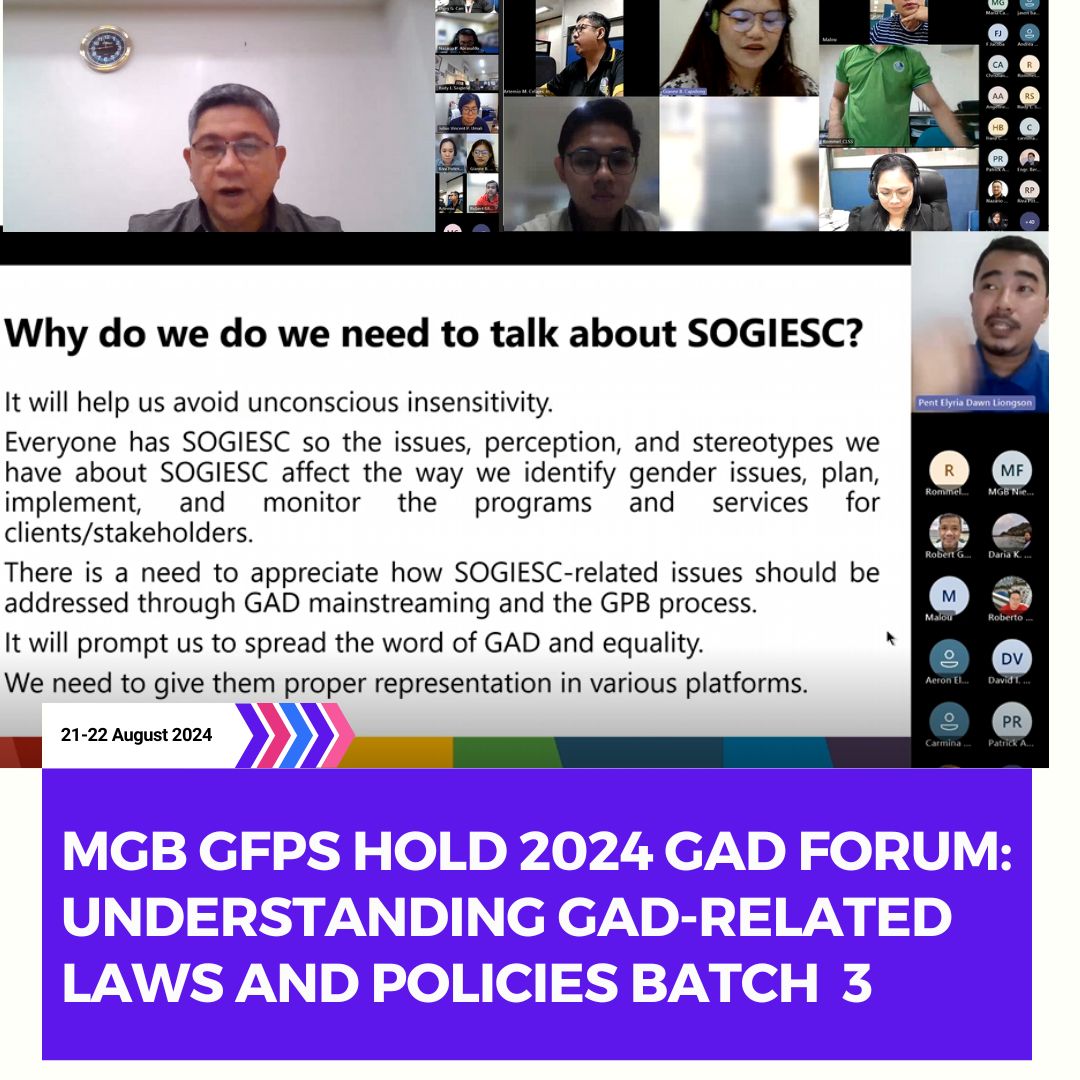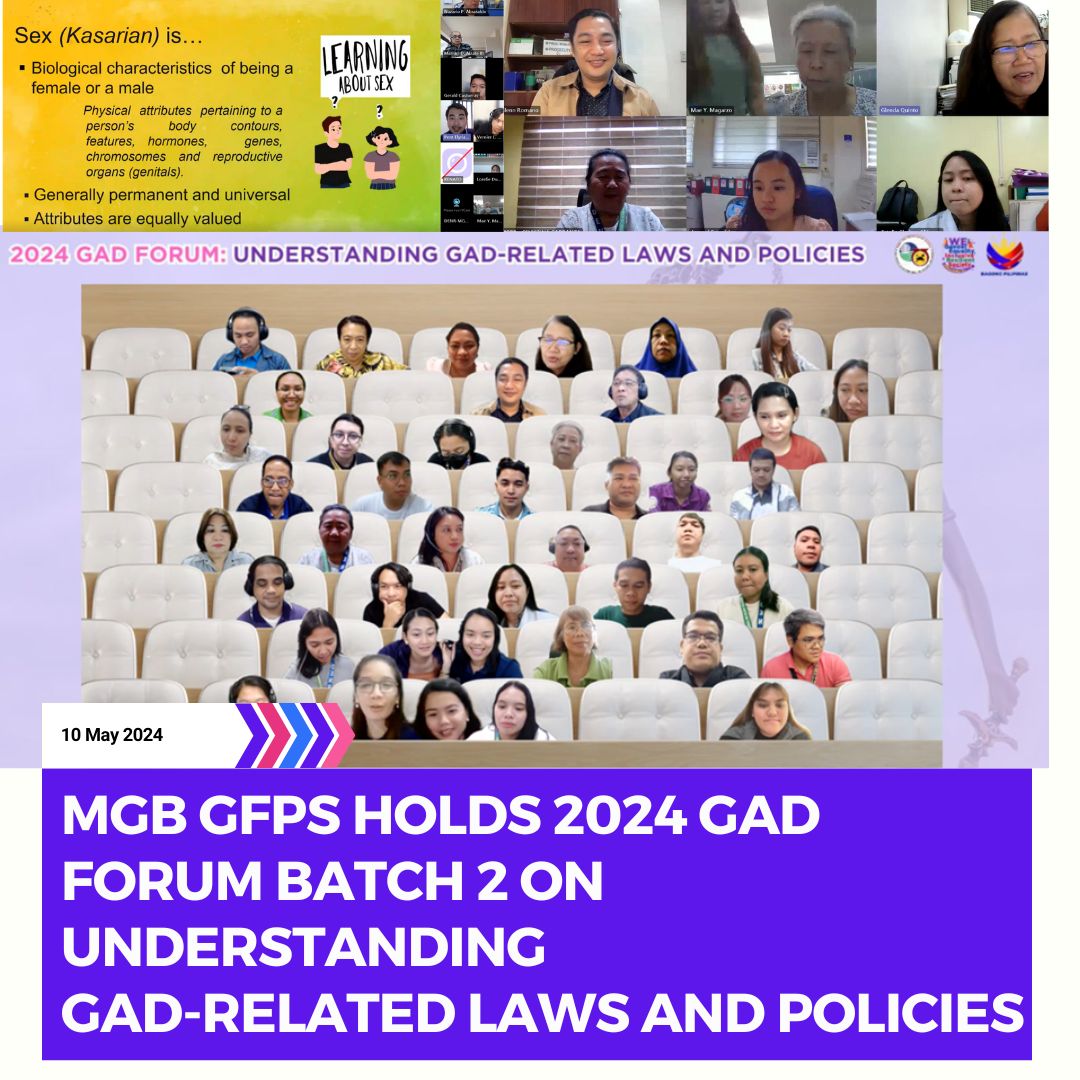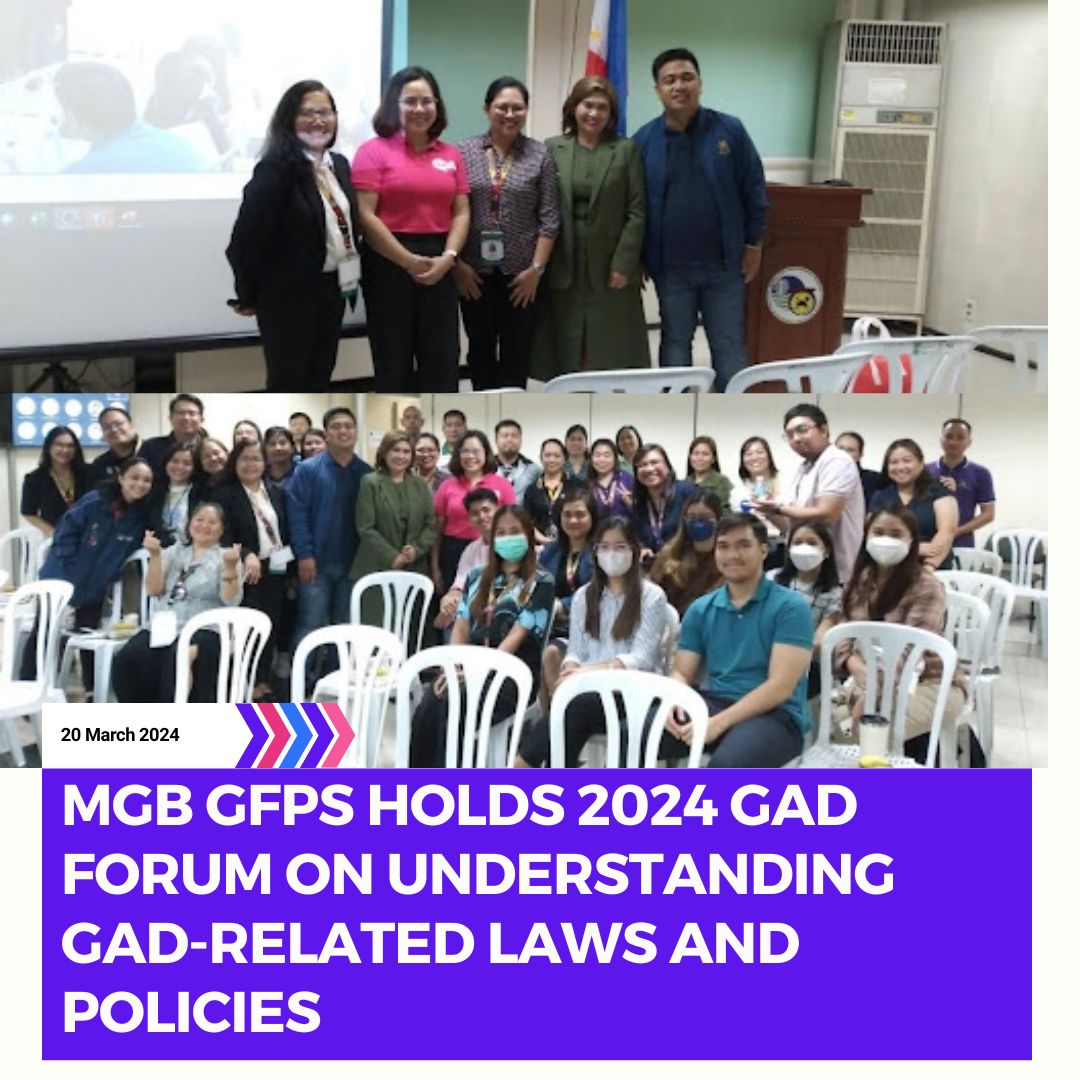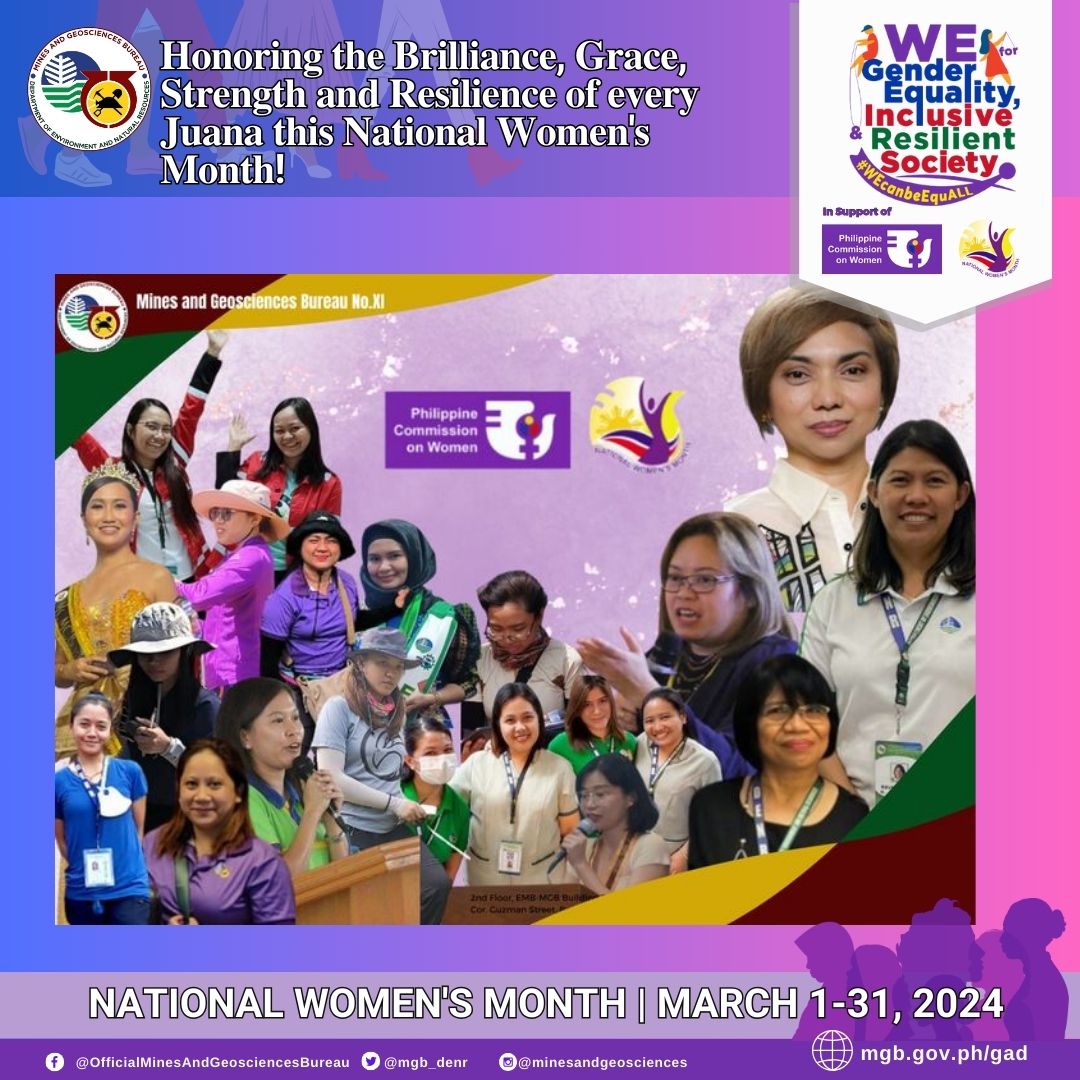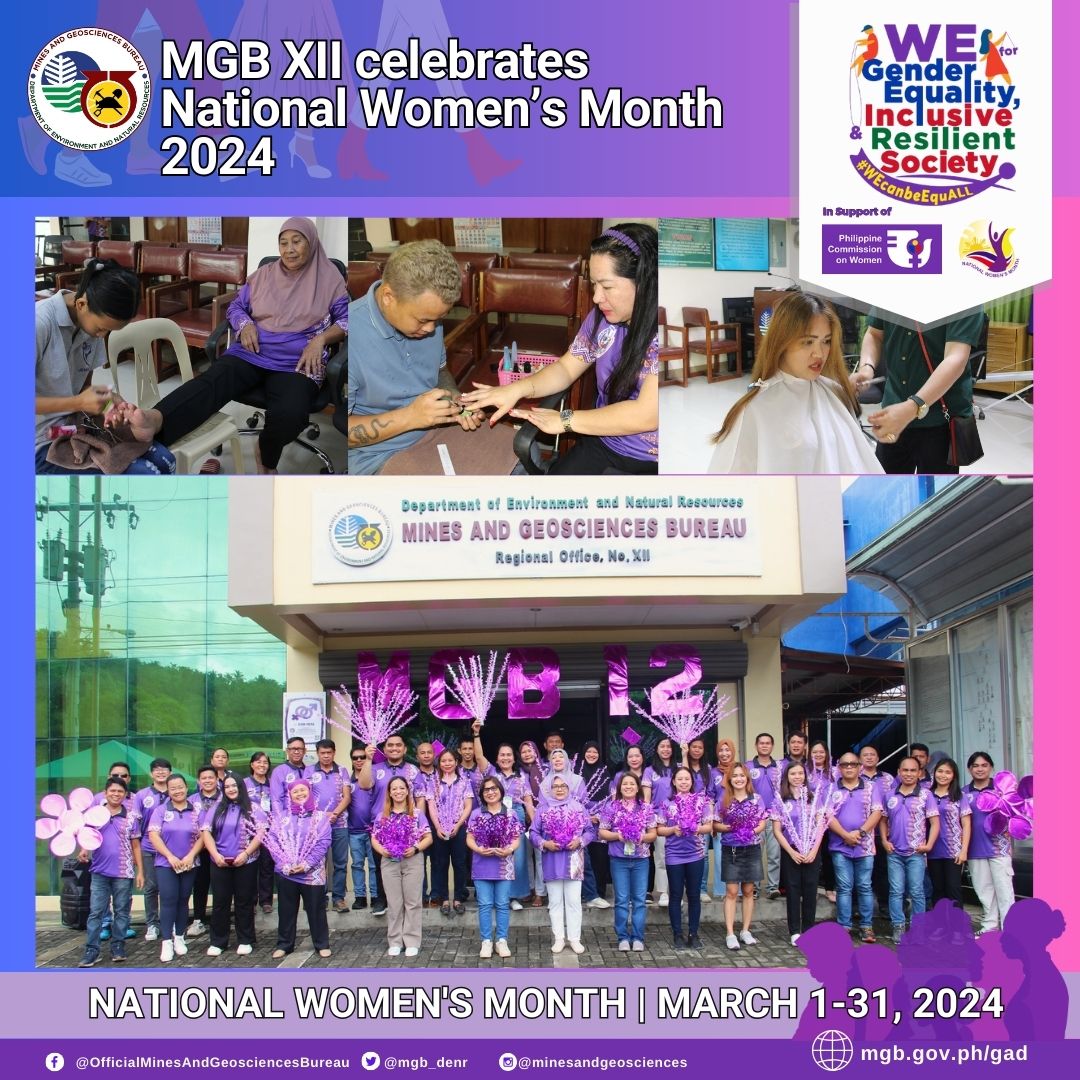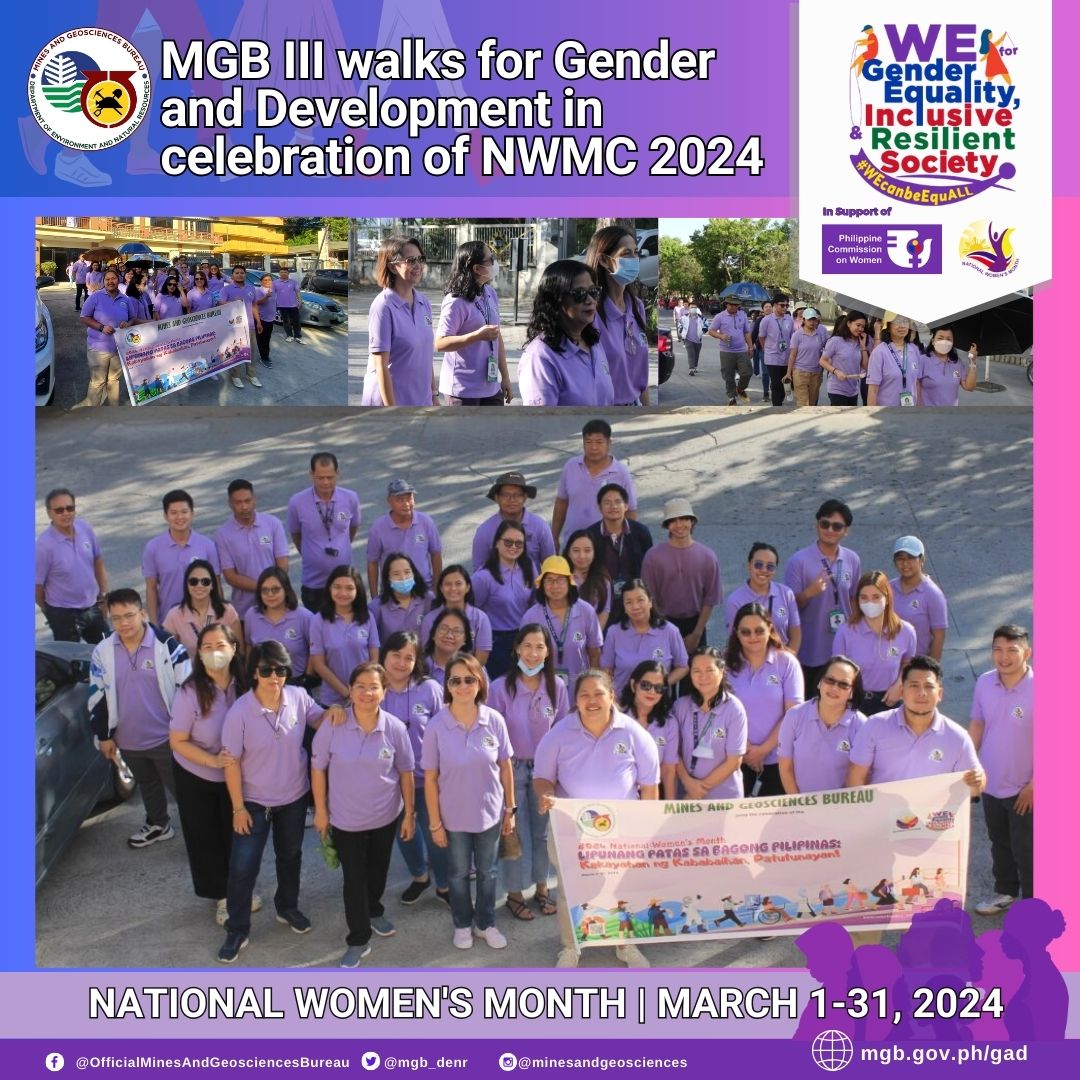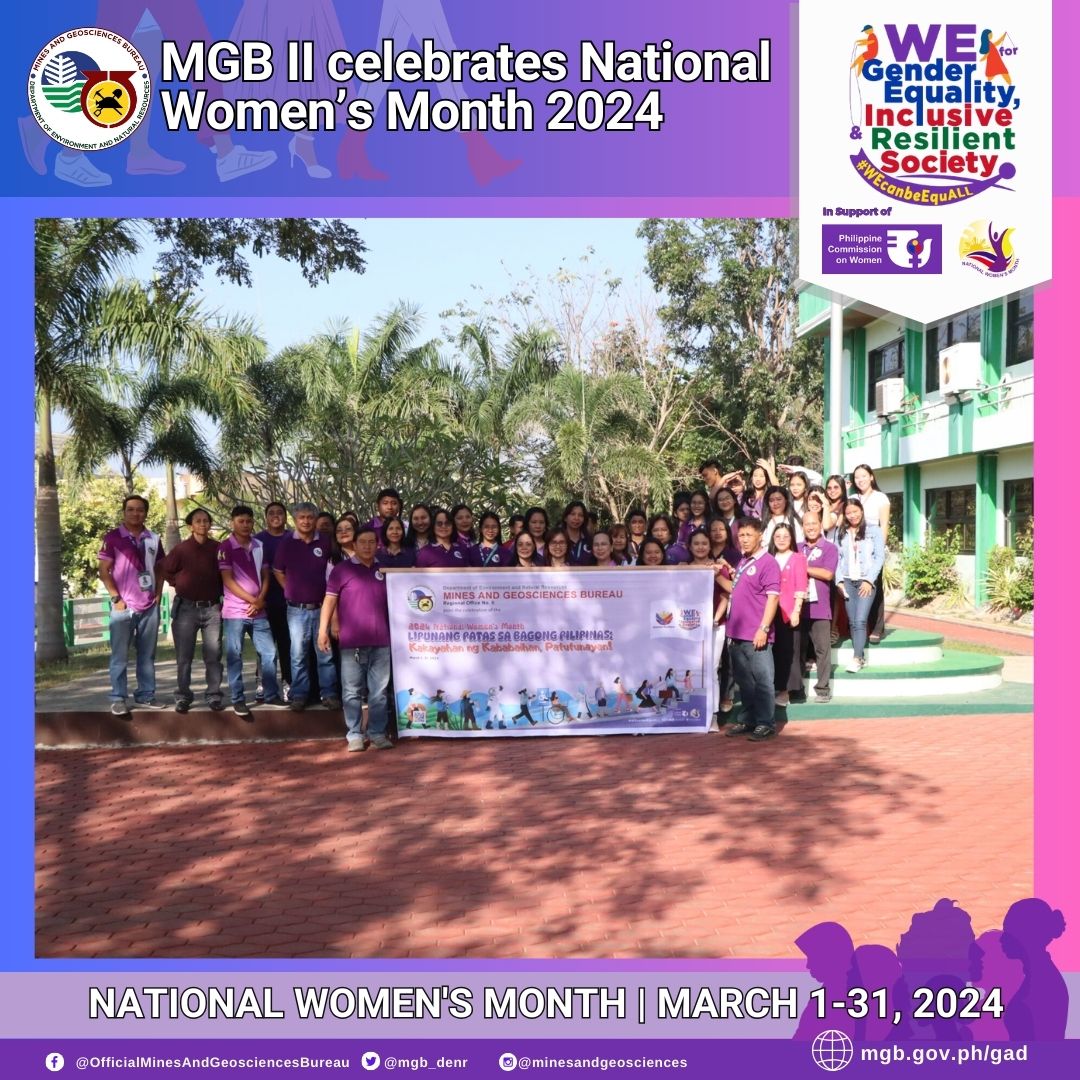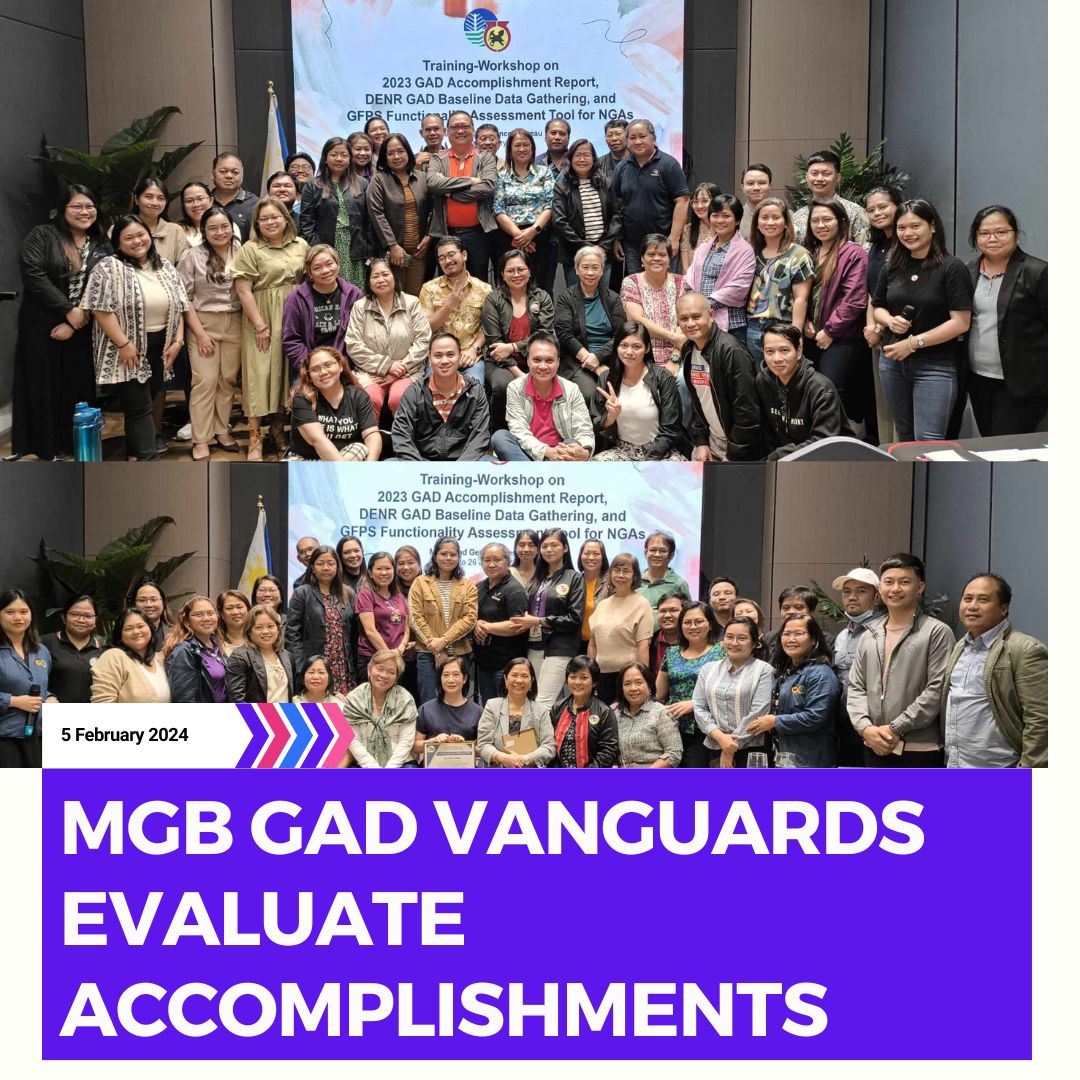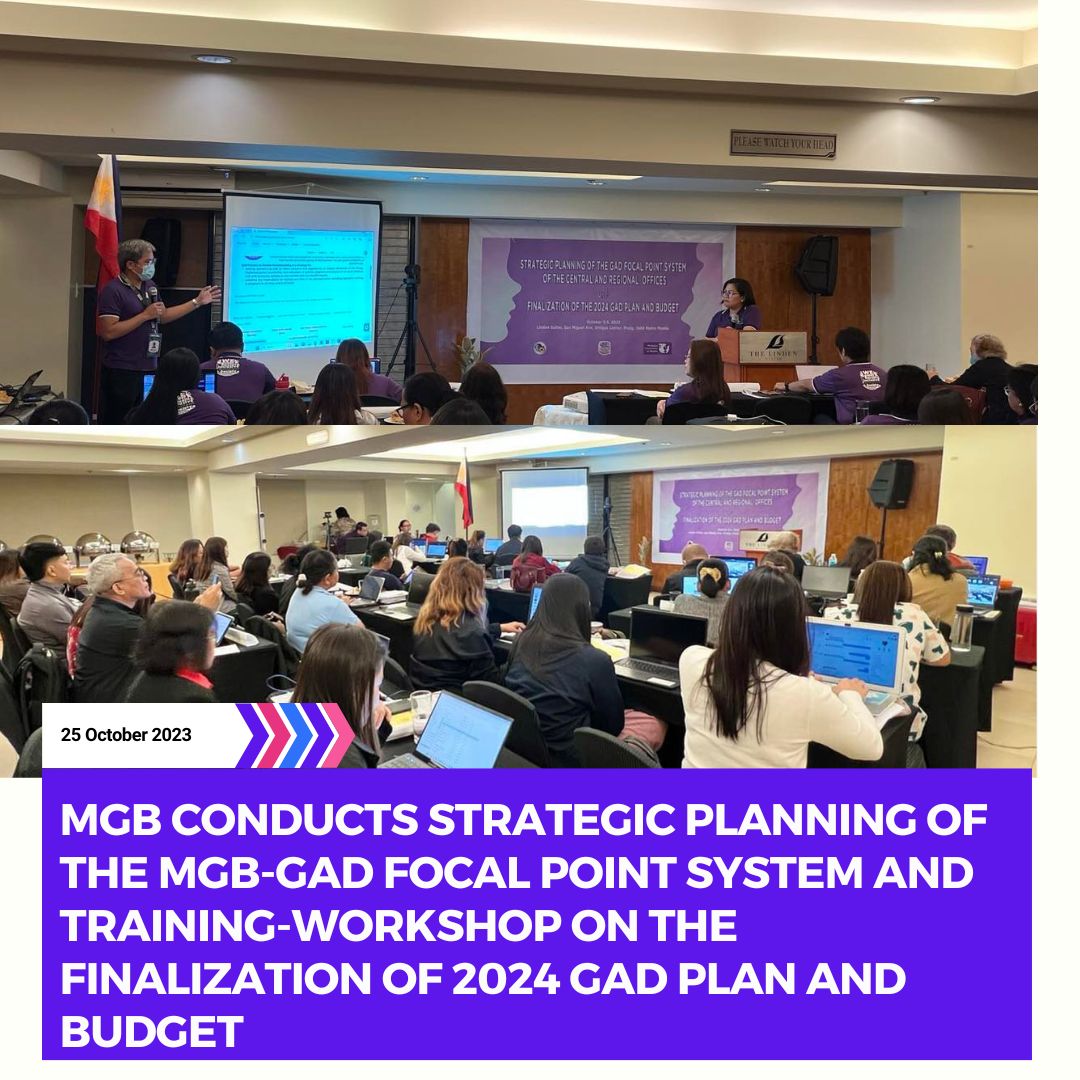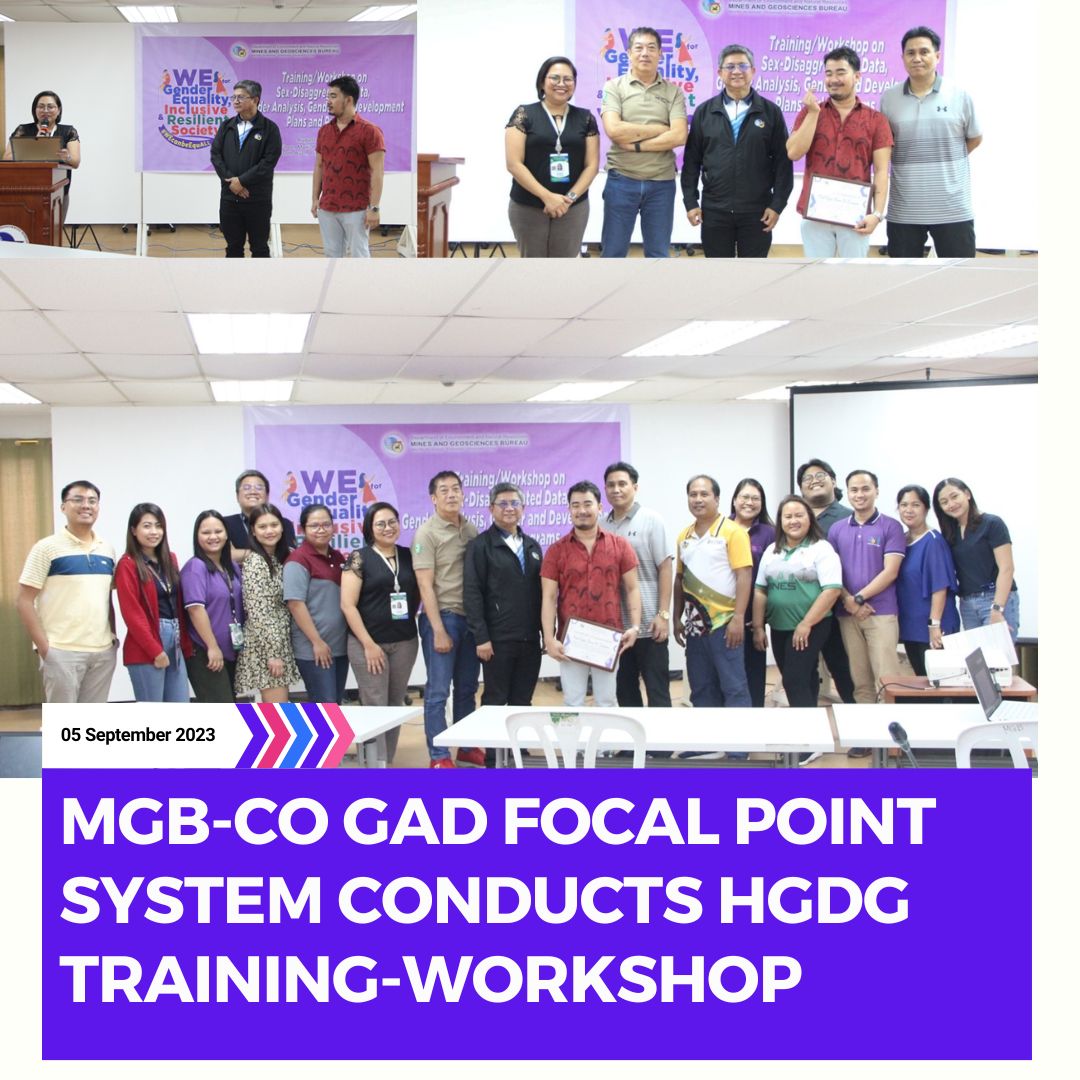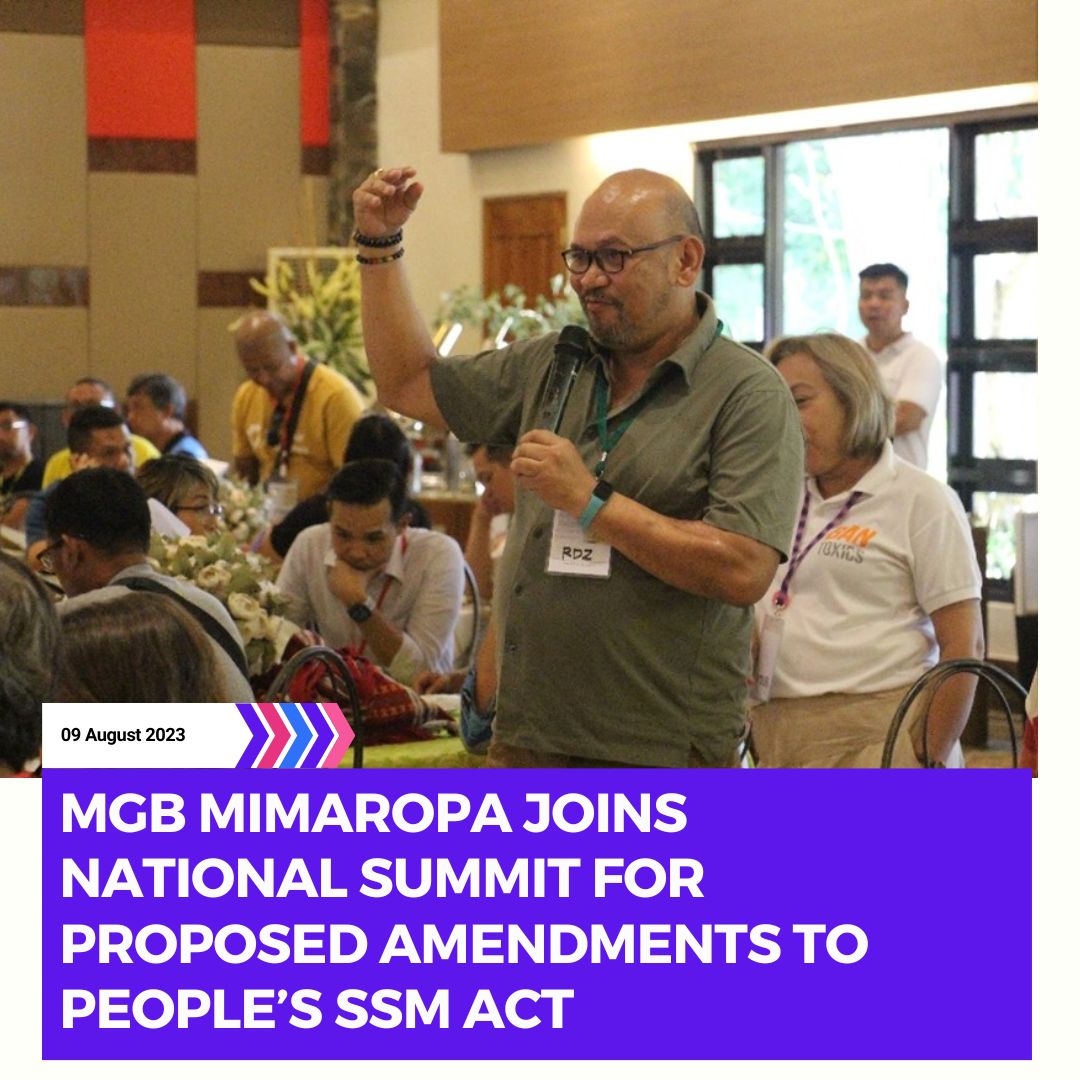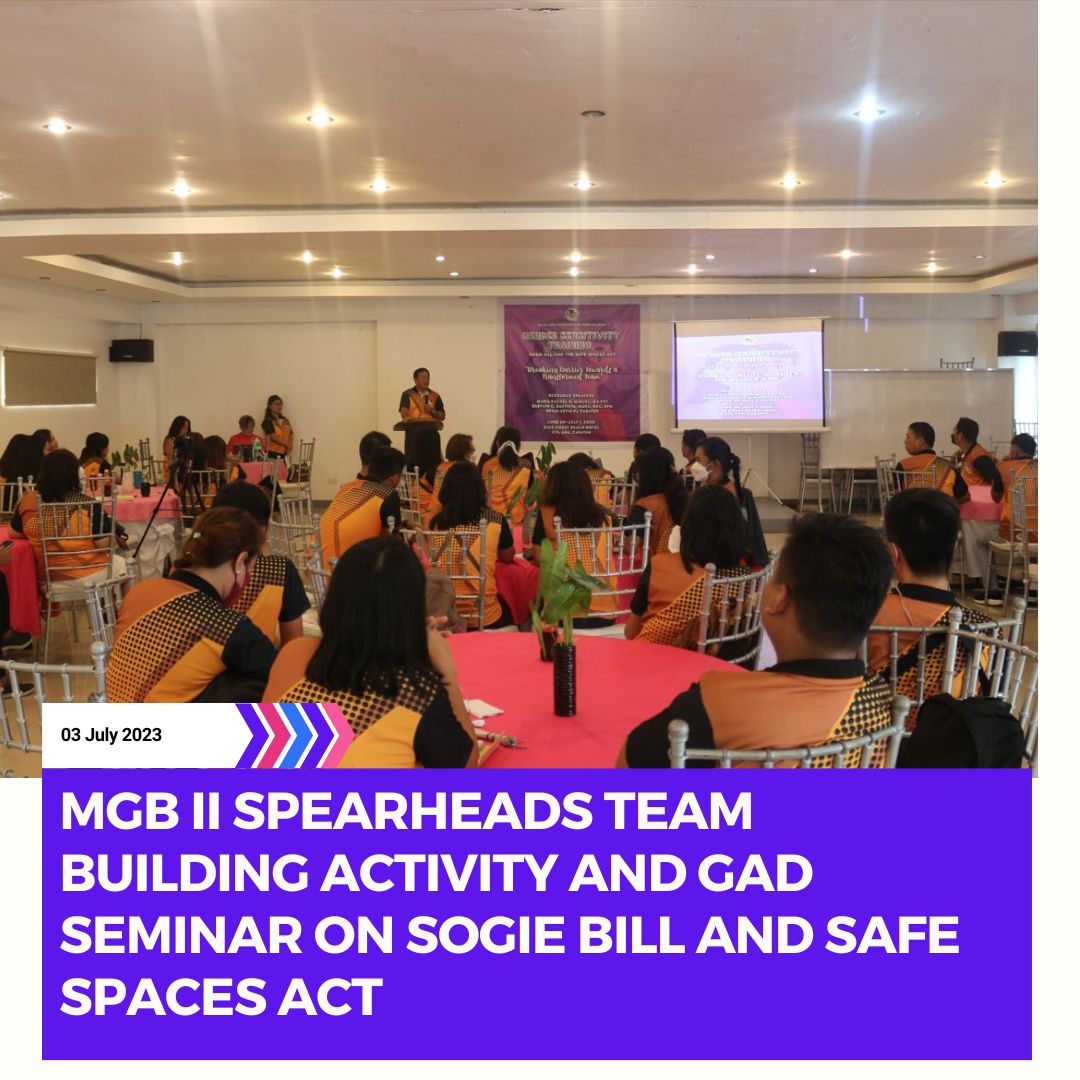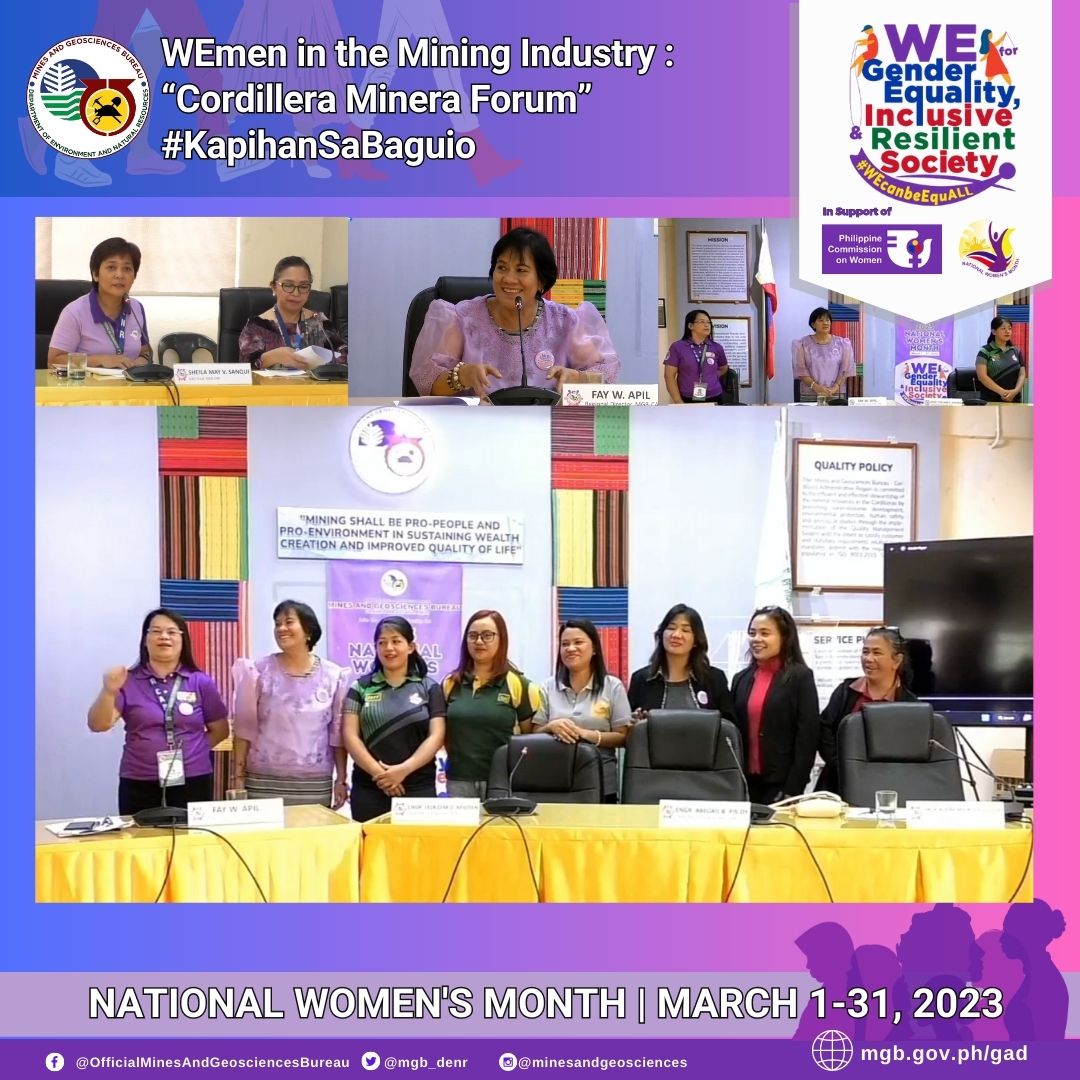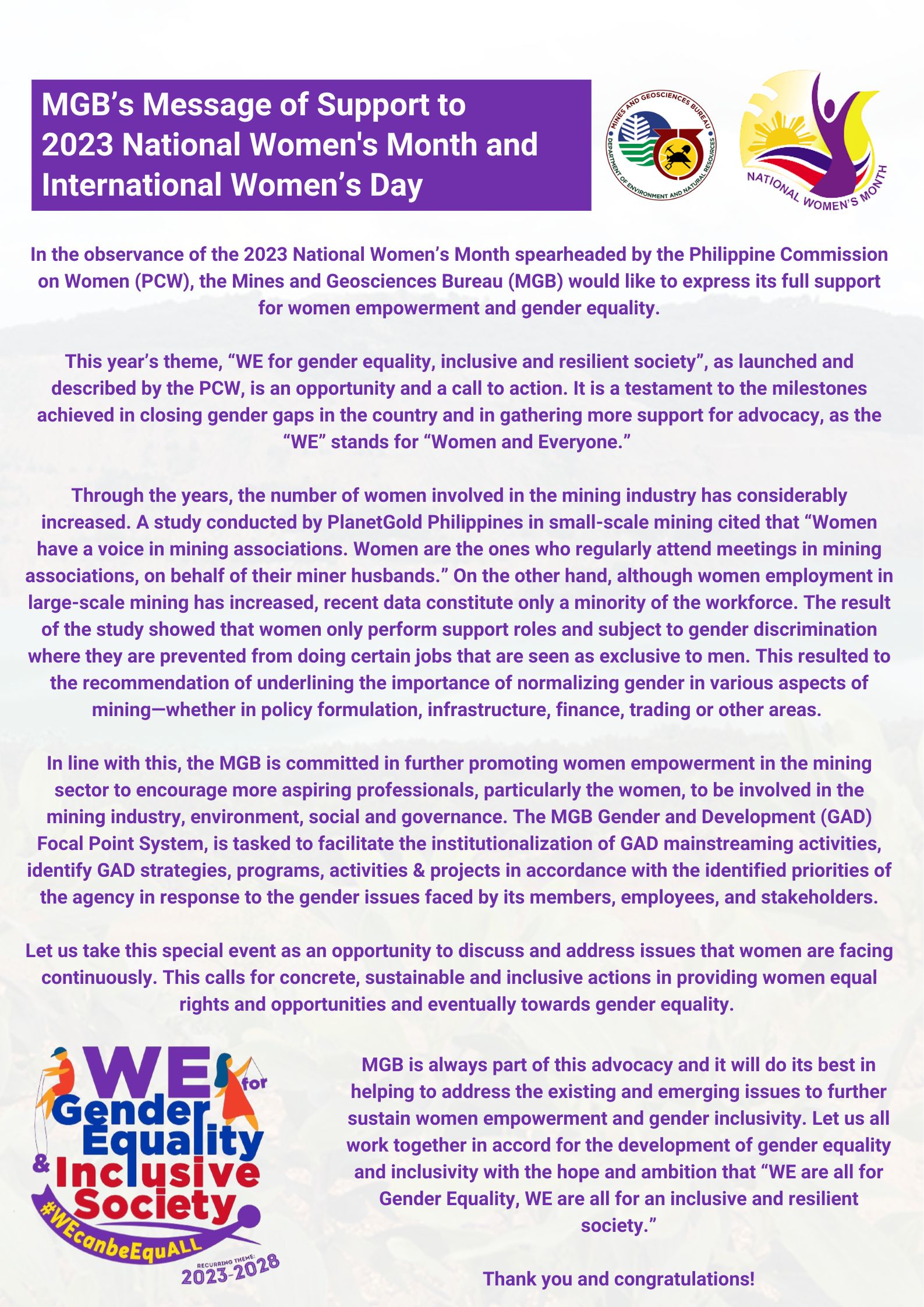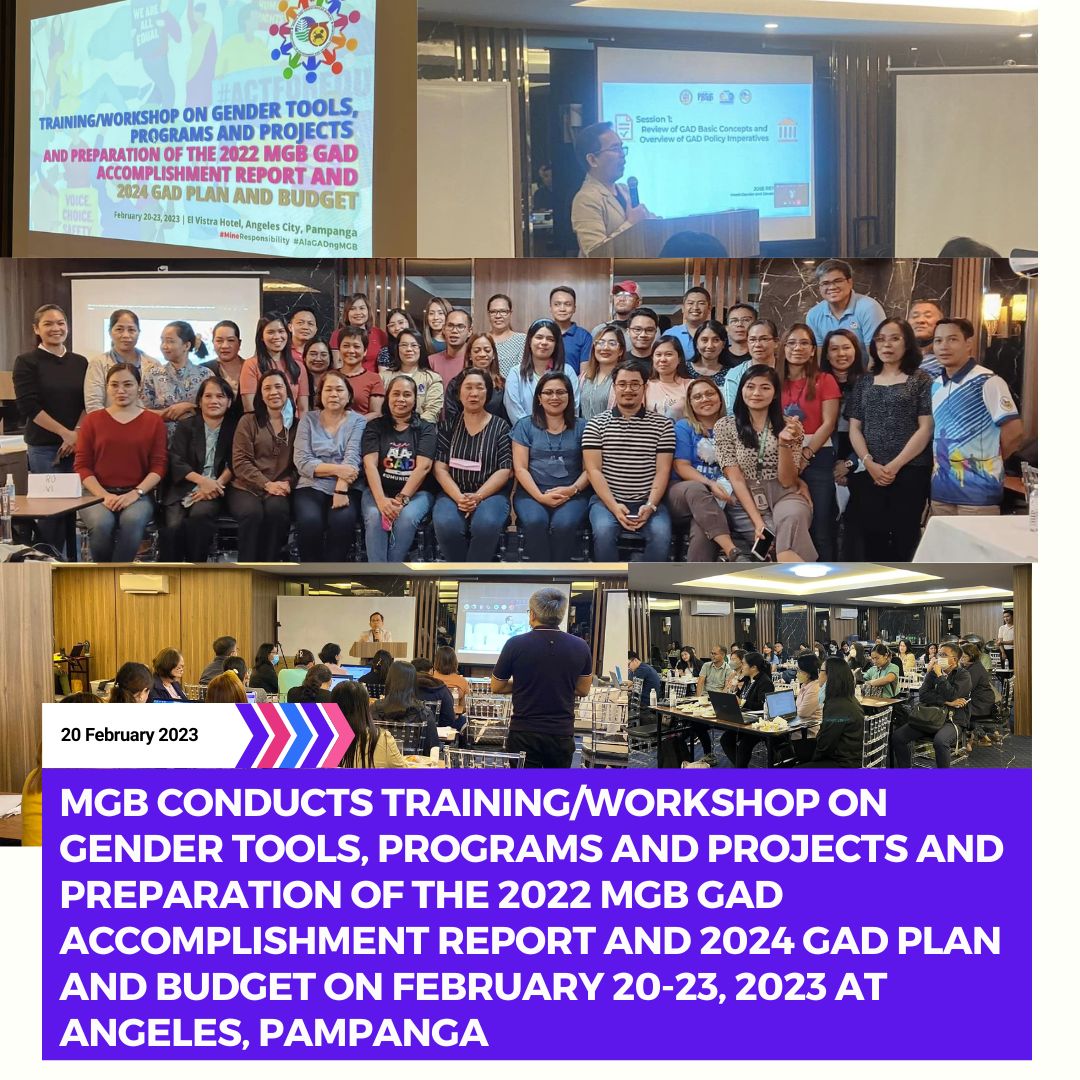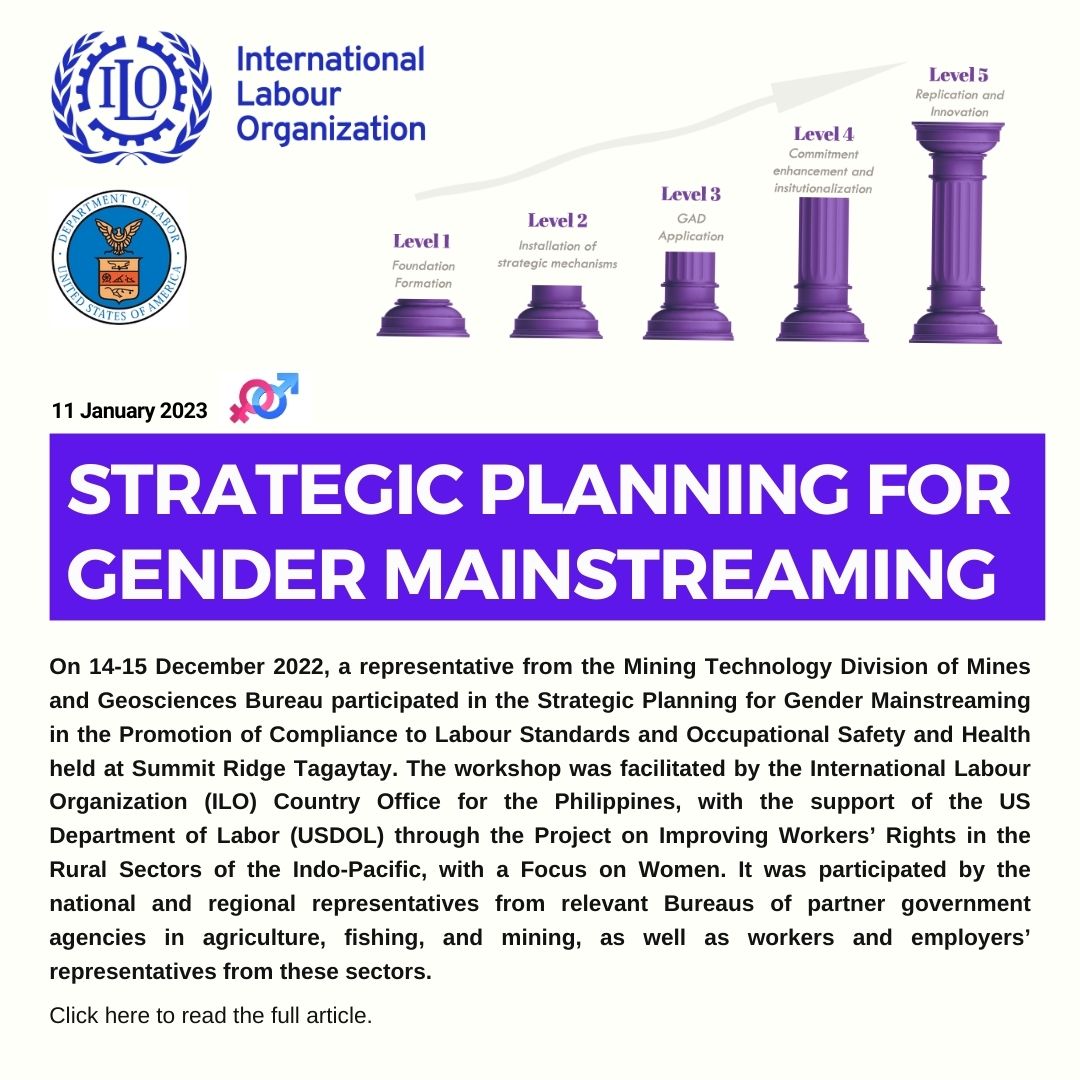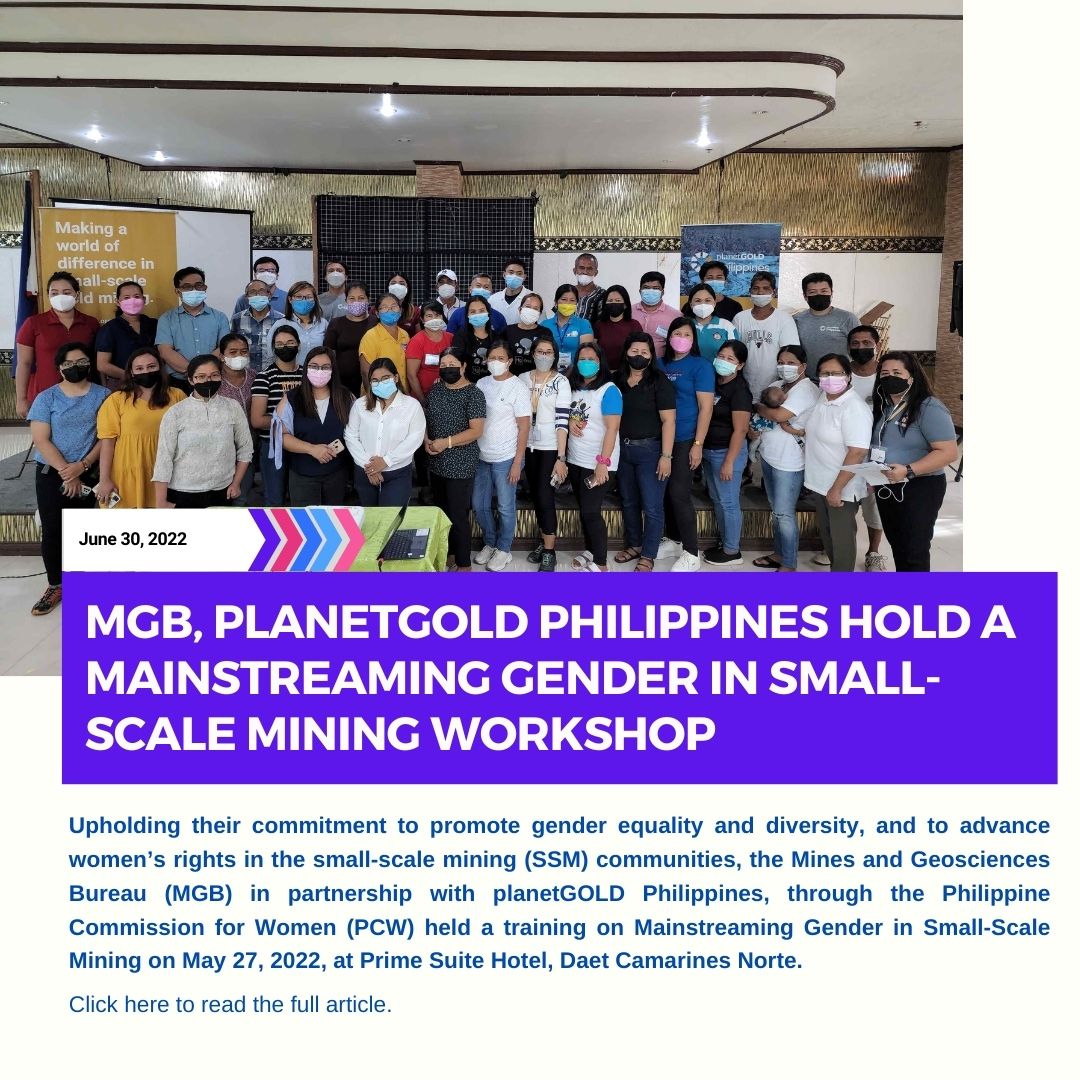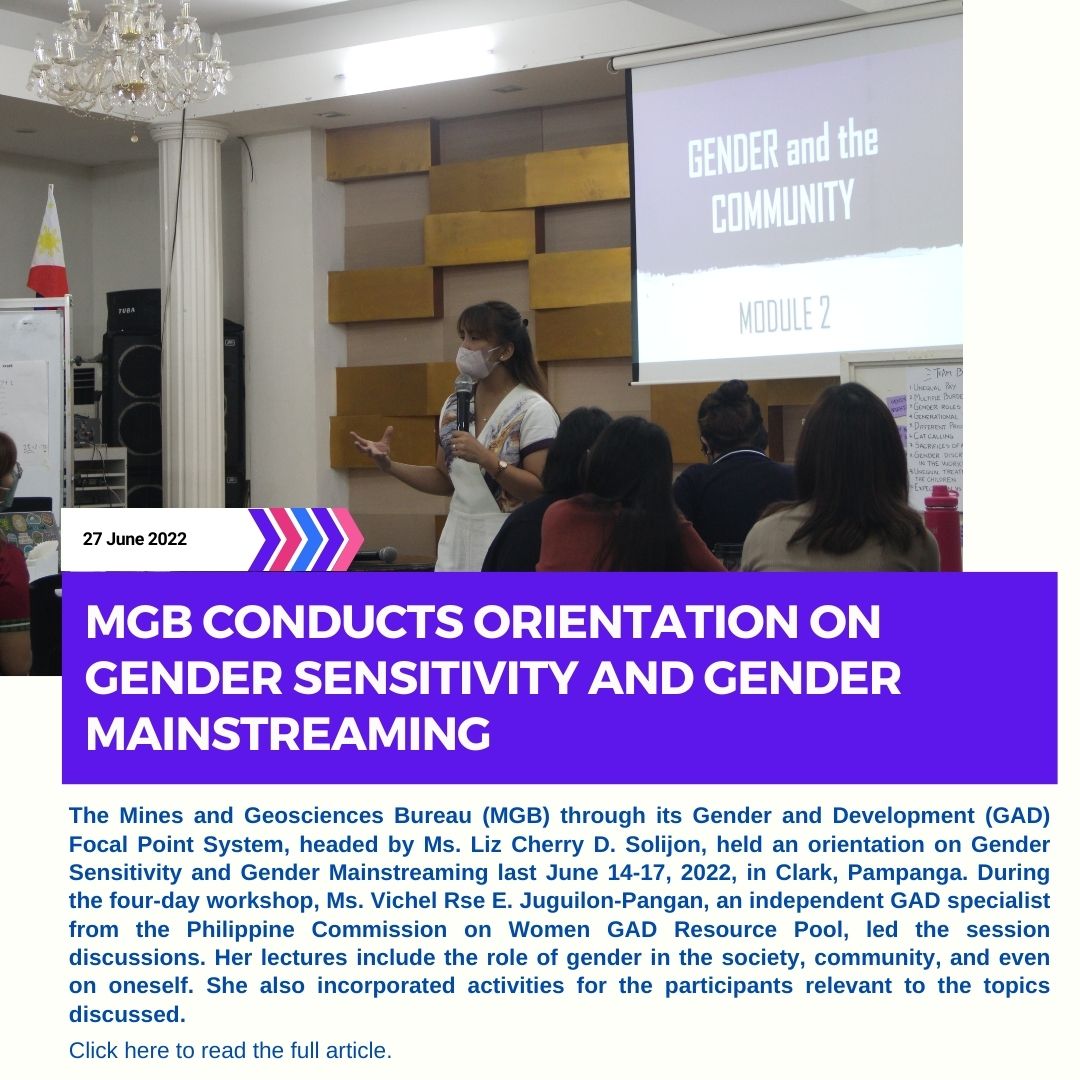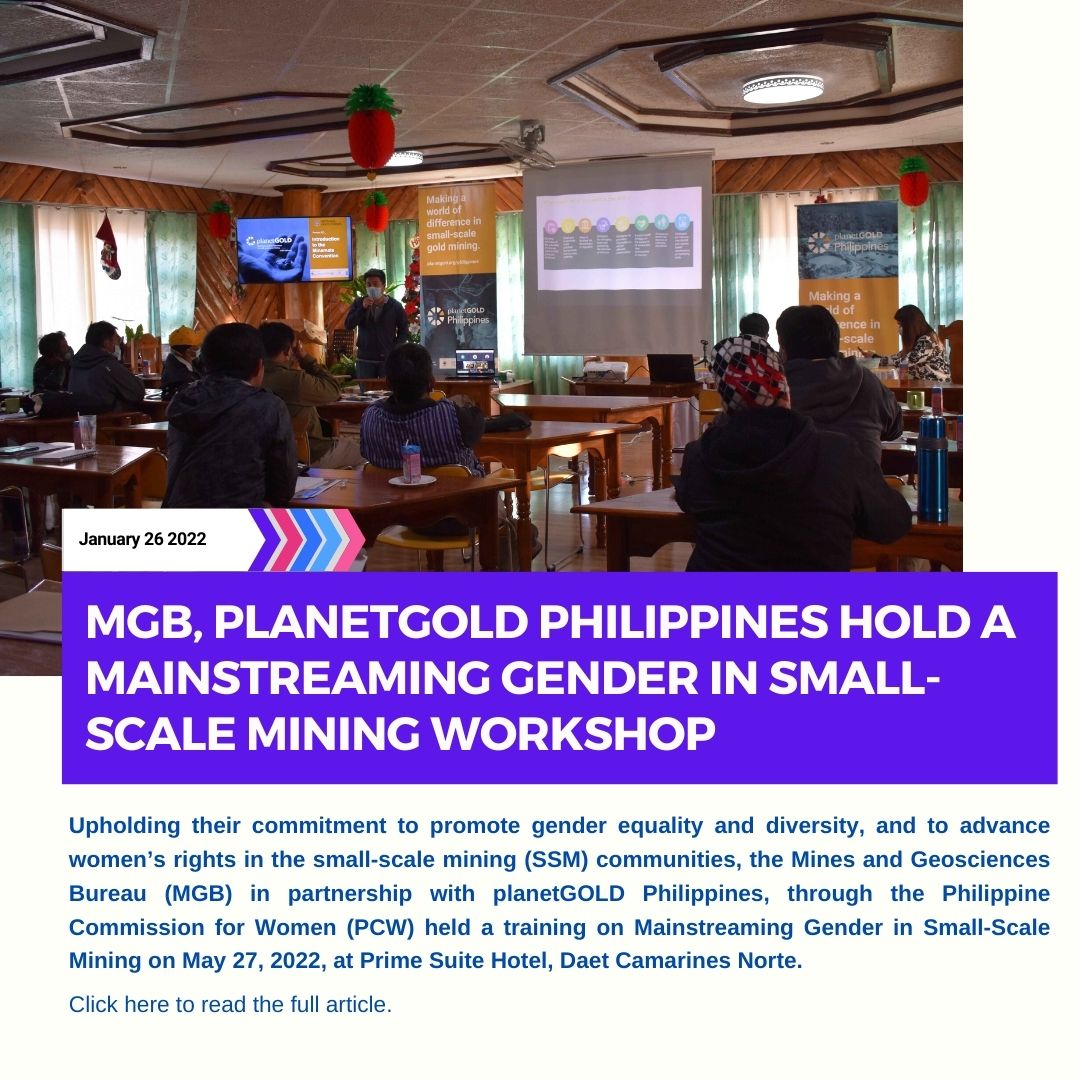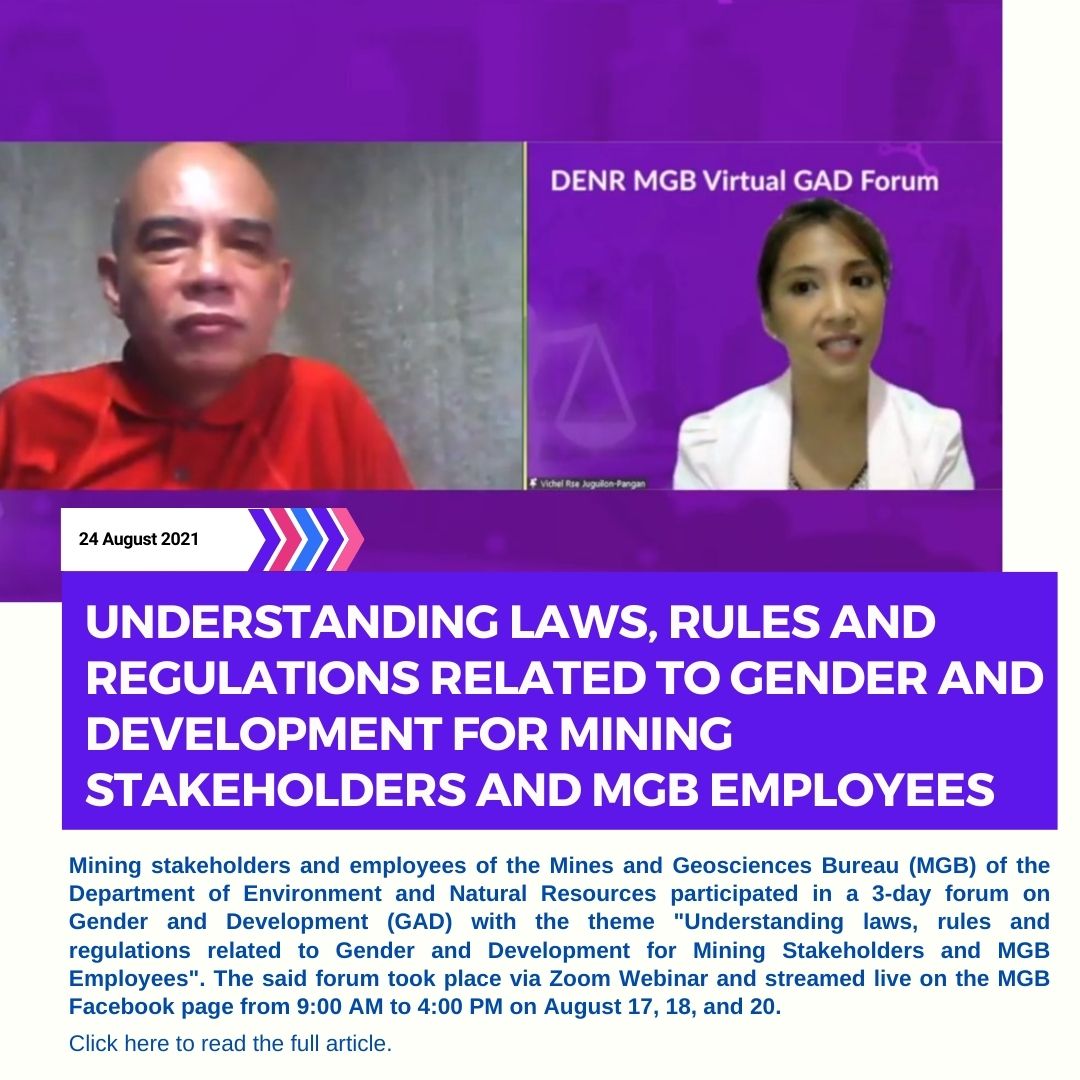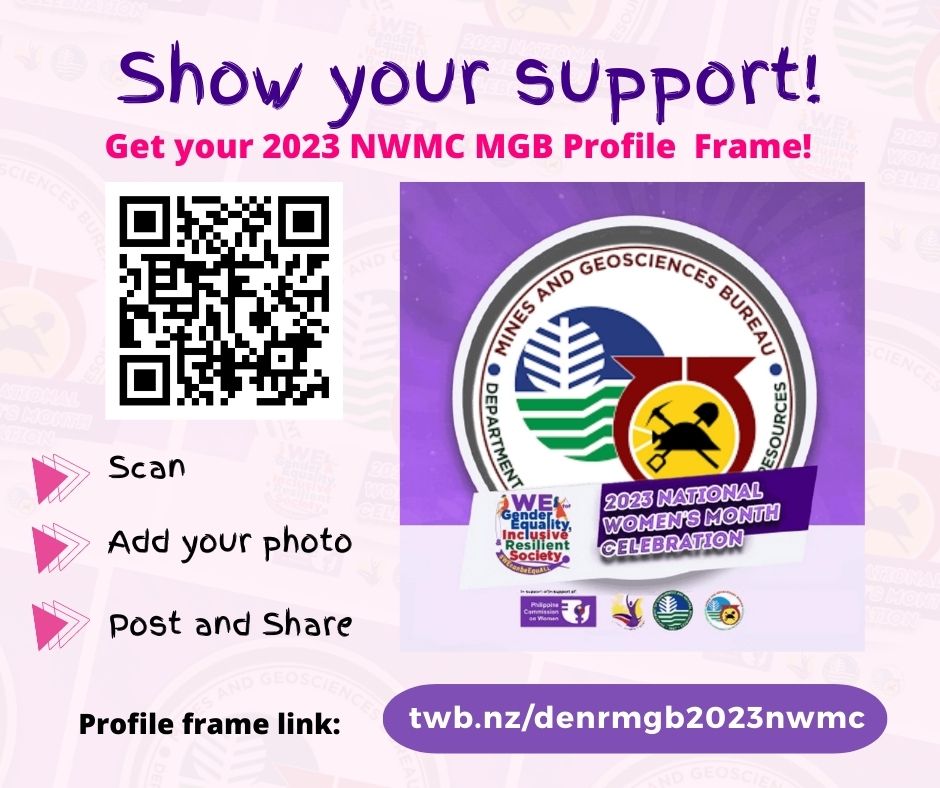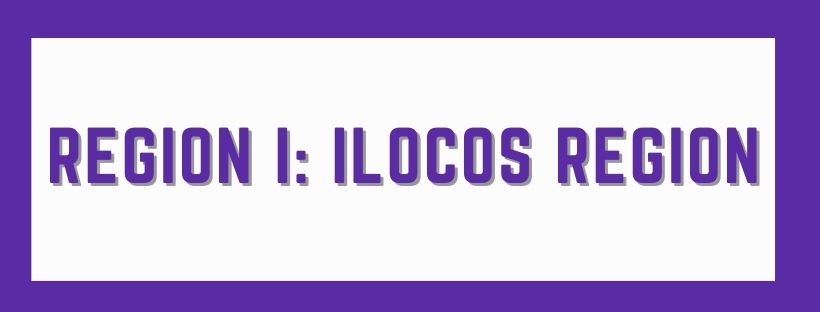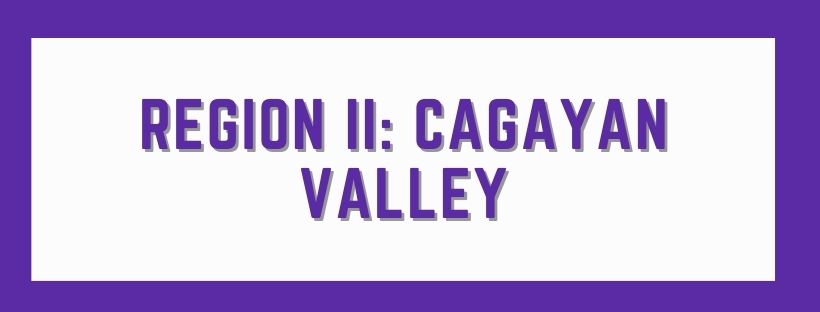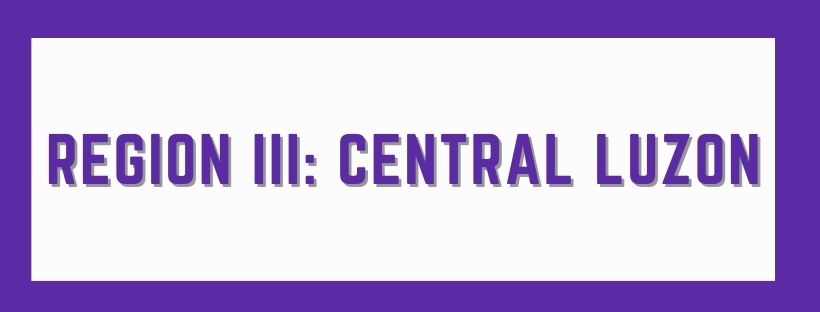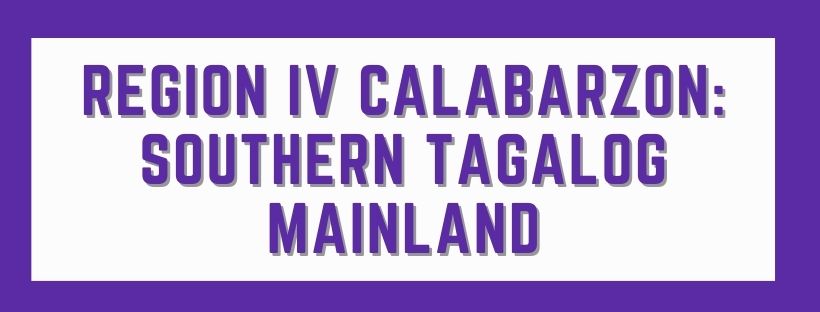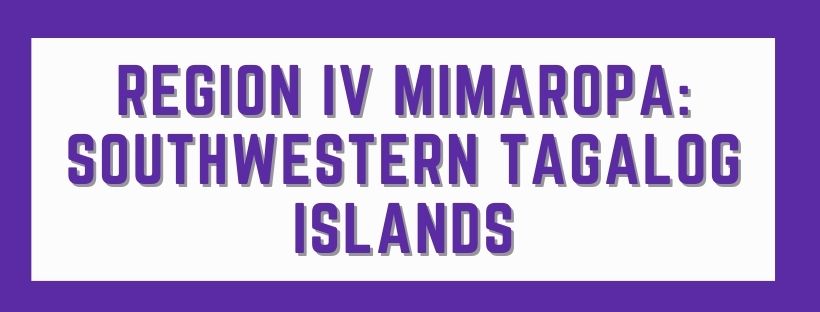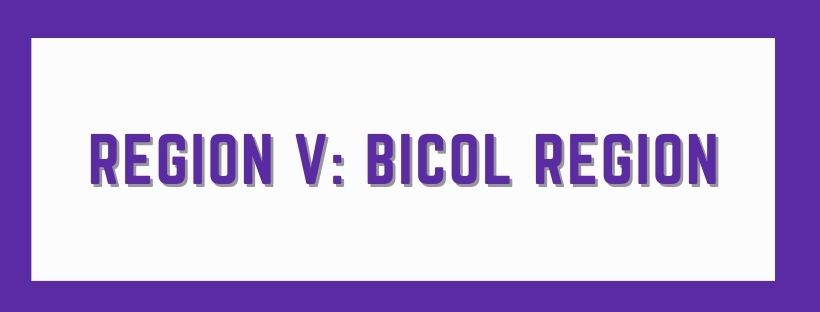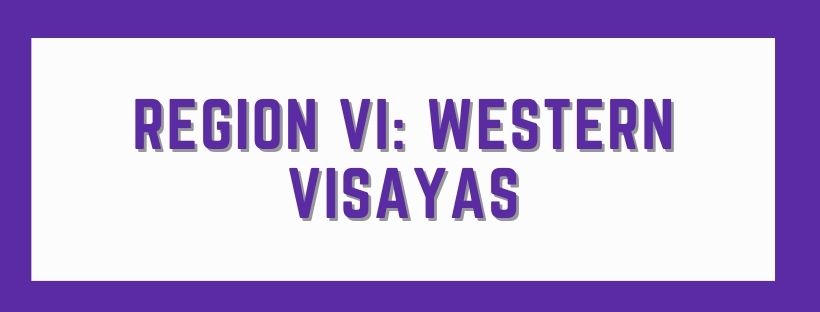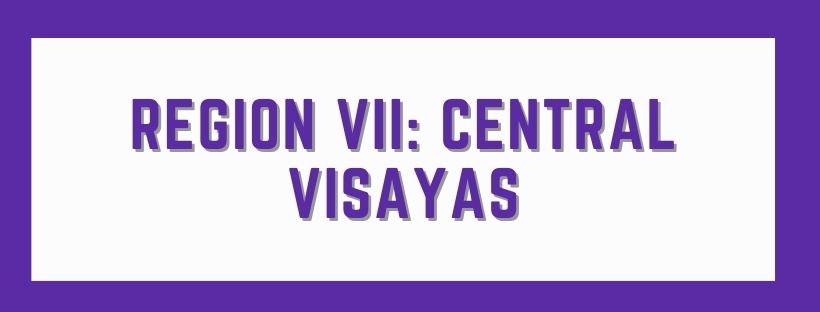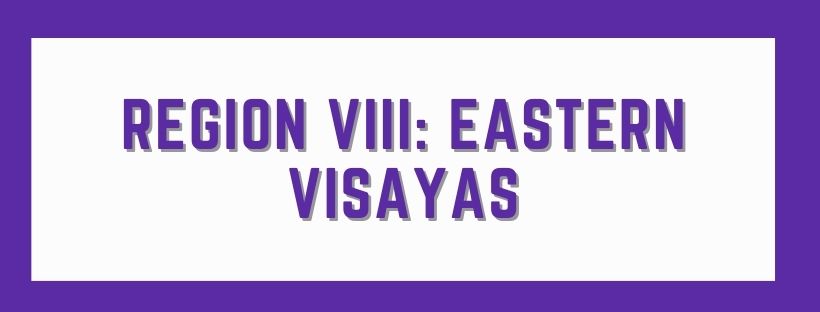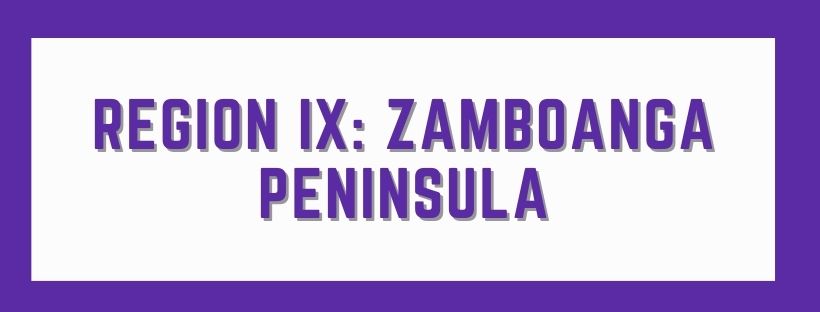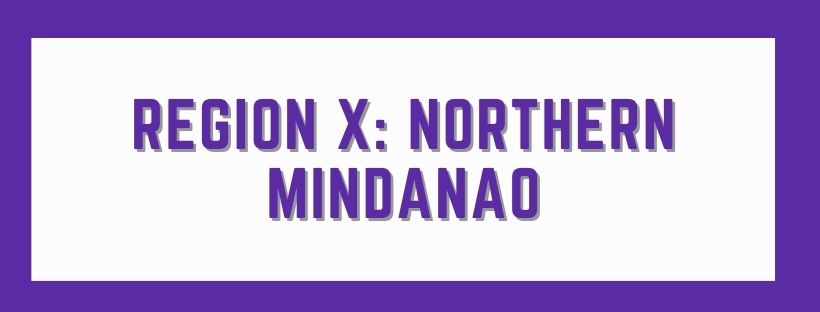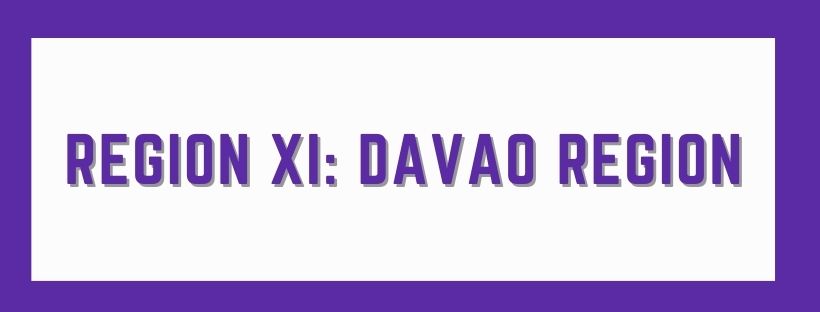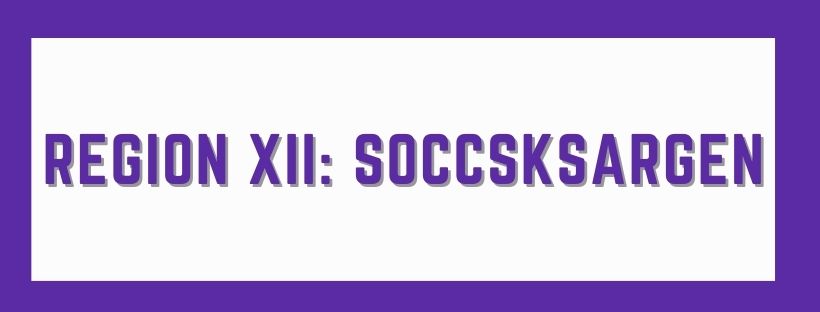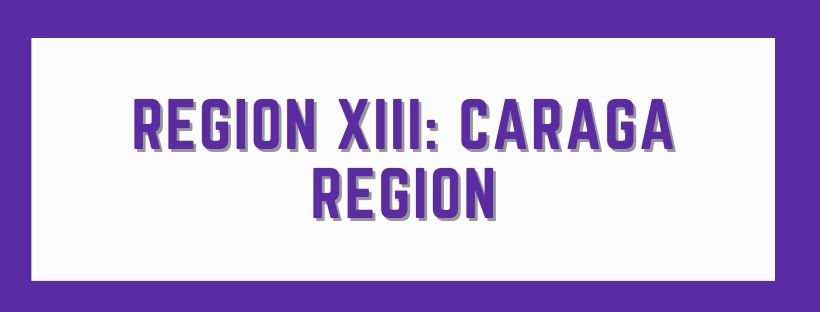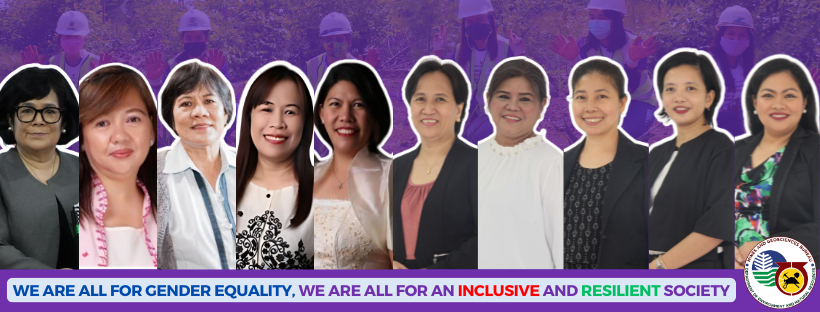
News and Updates
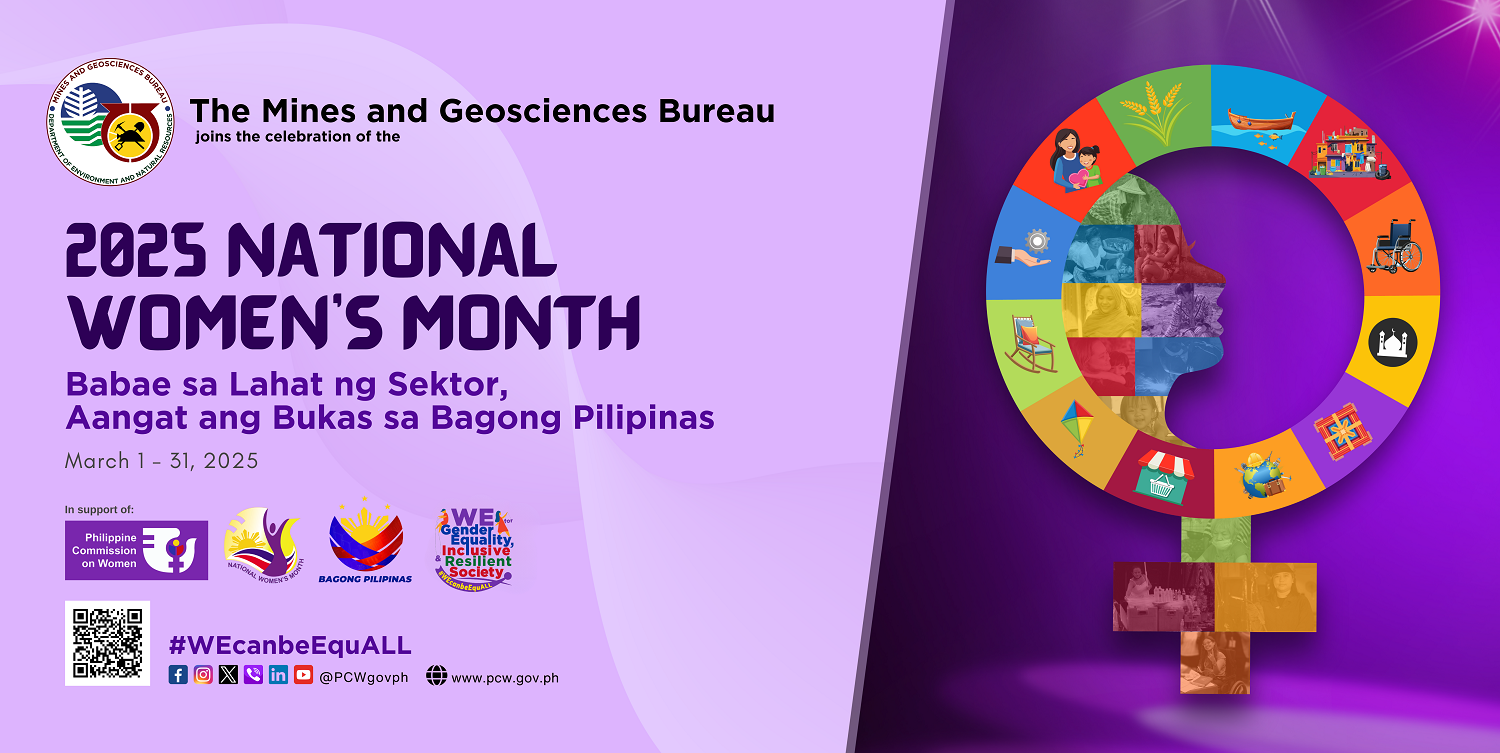
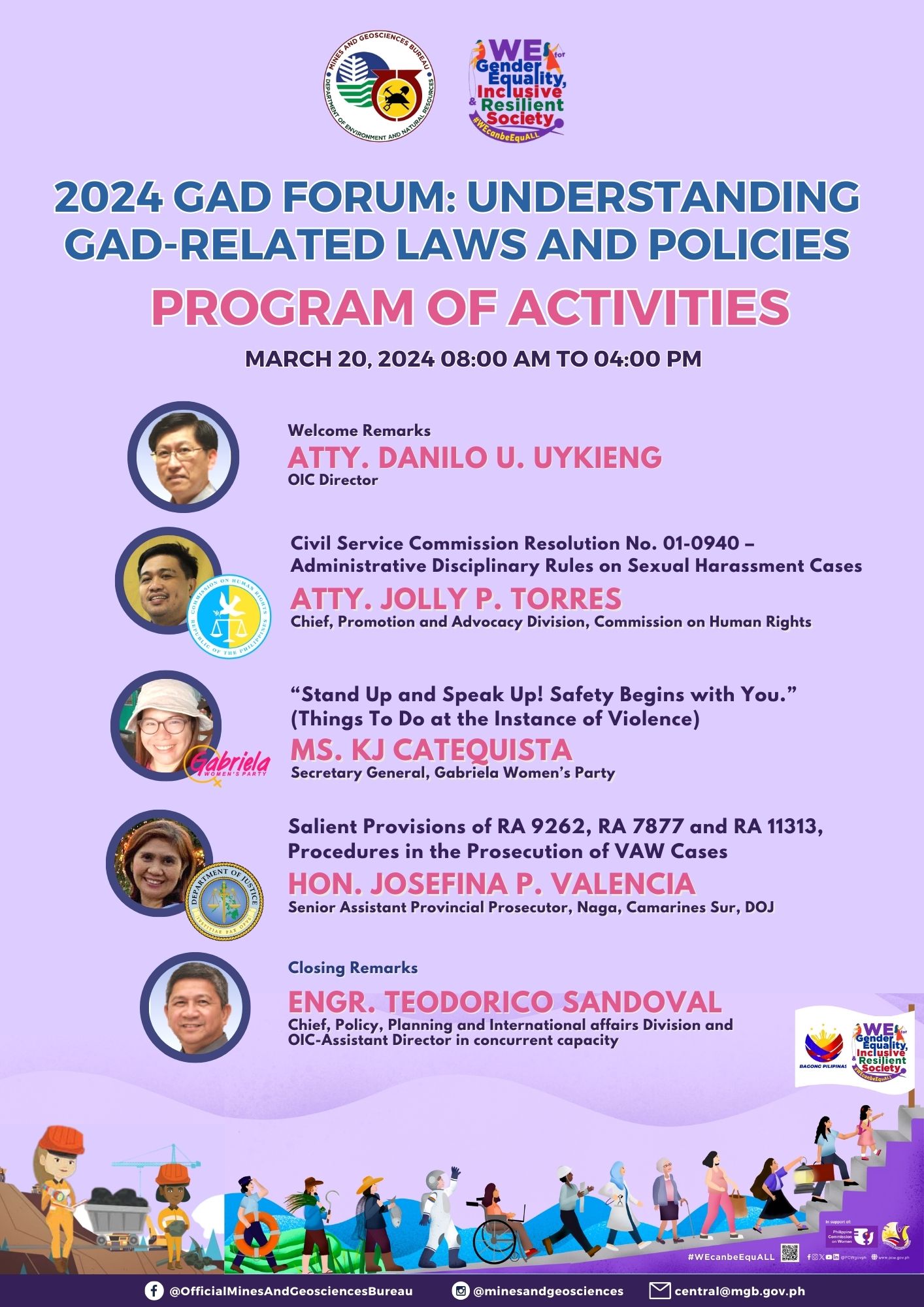
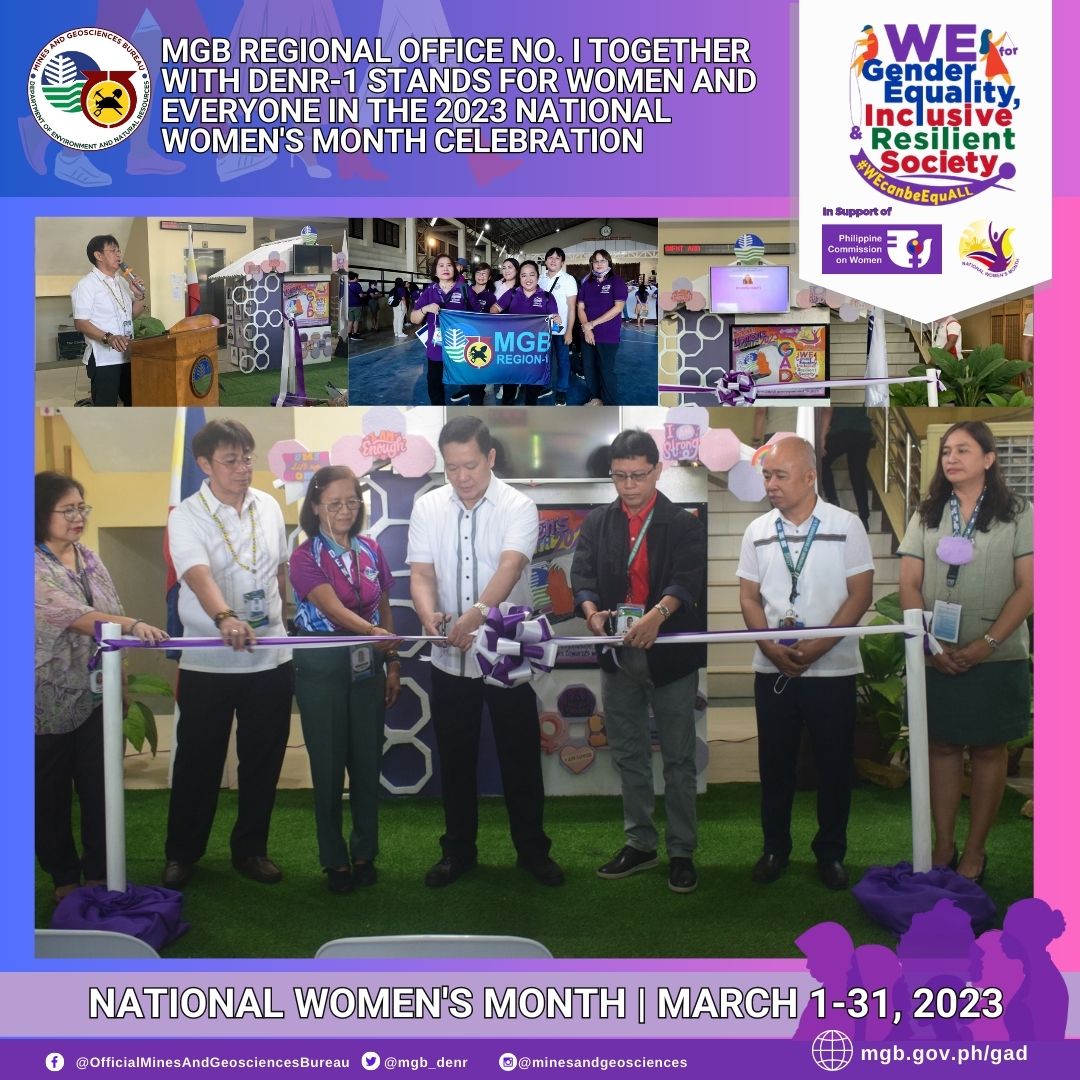
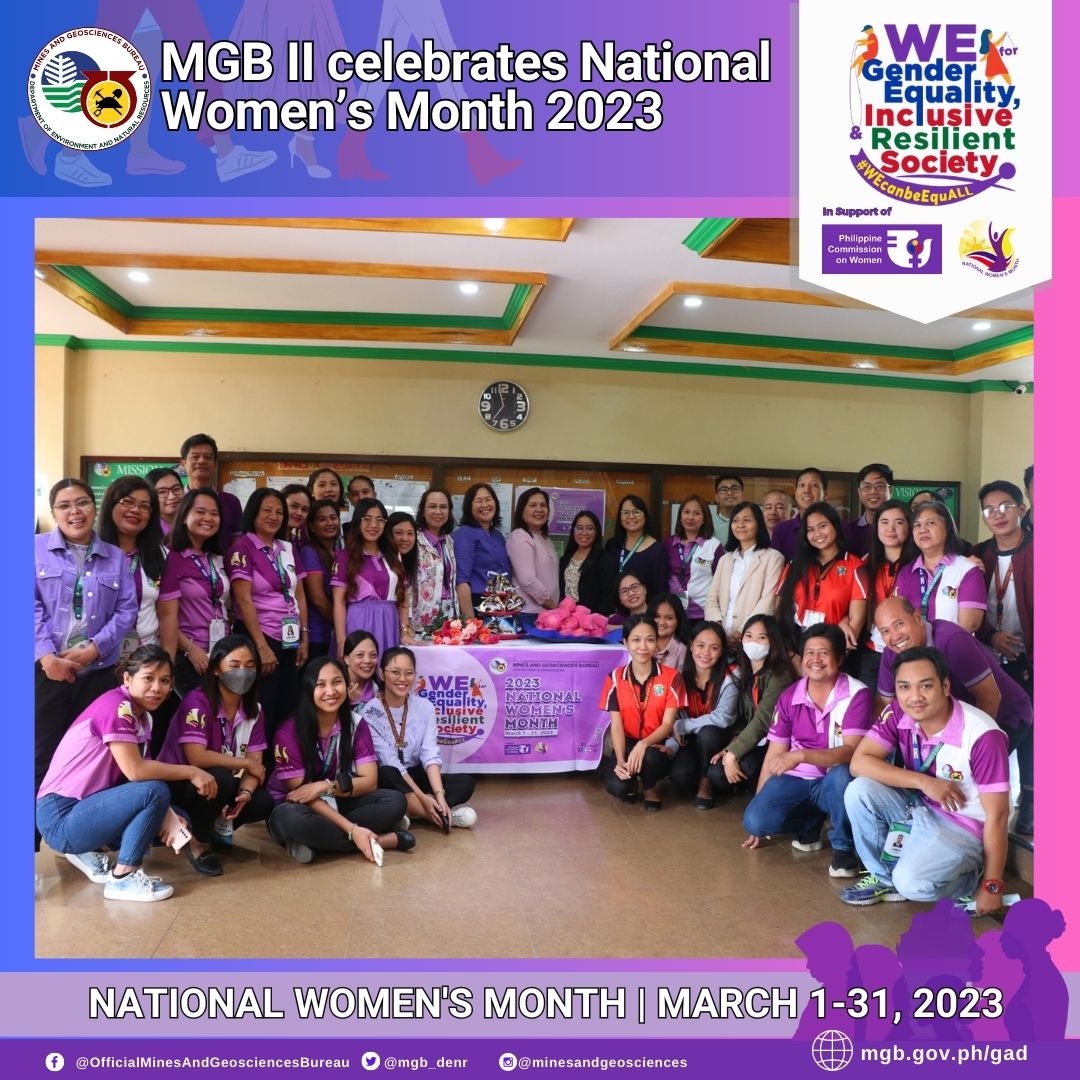
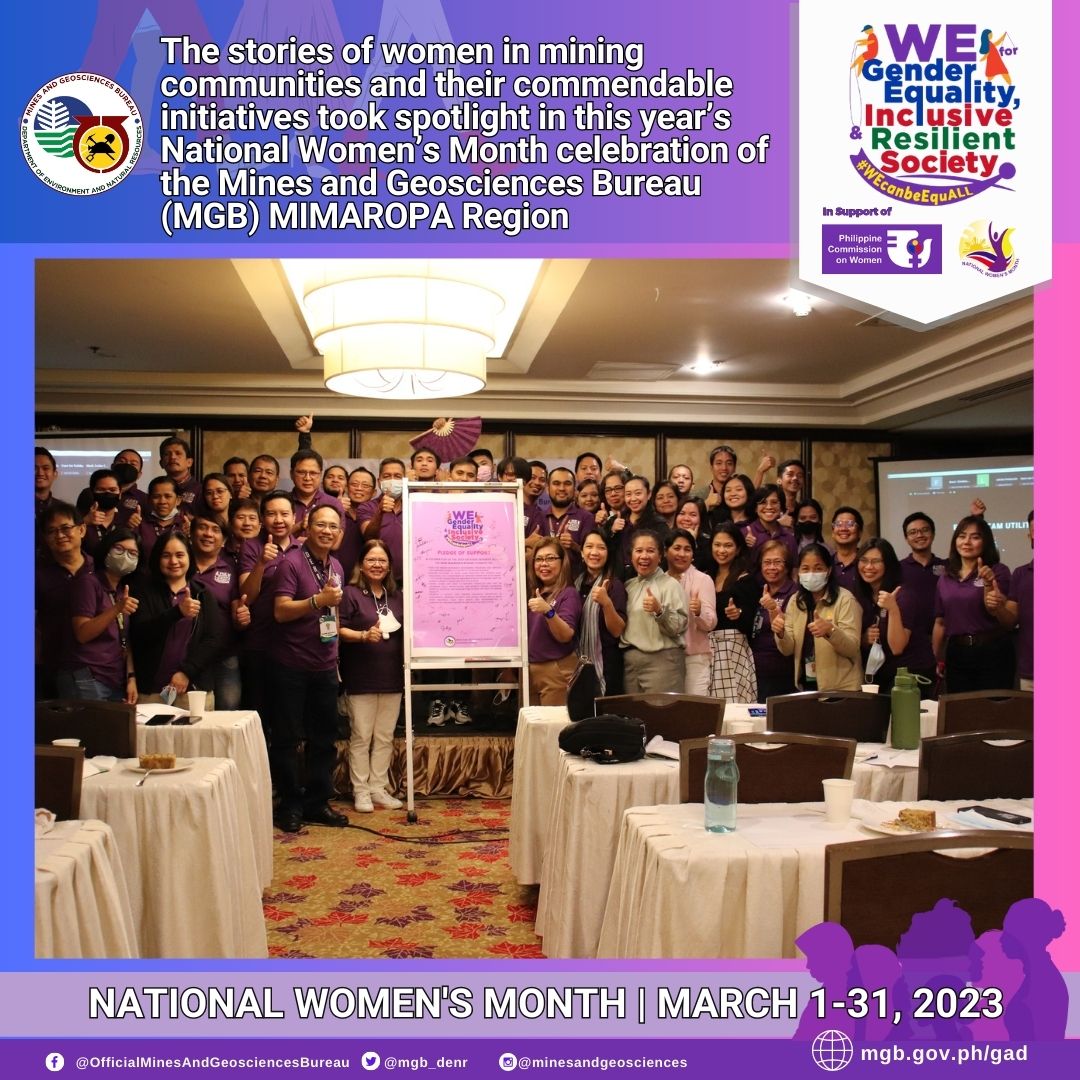
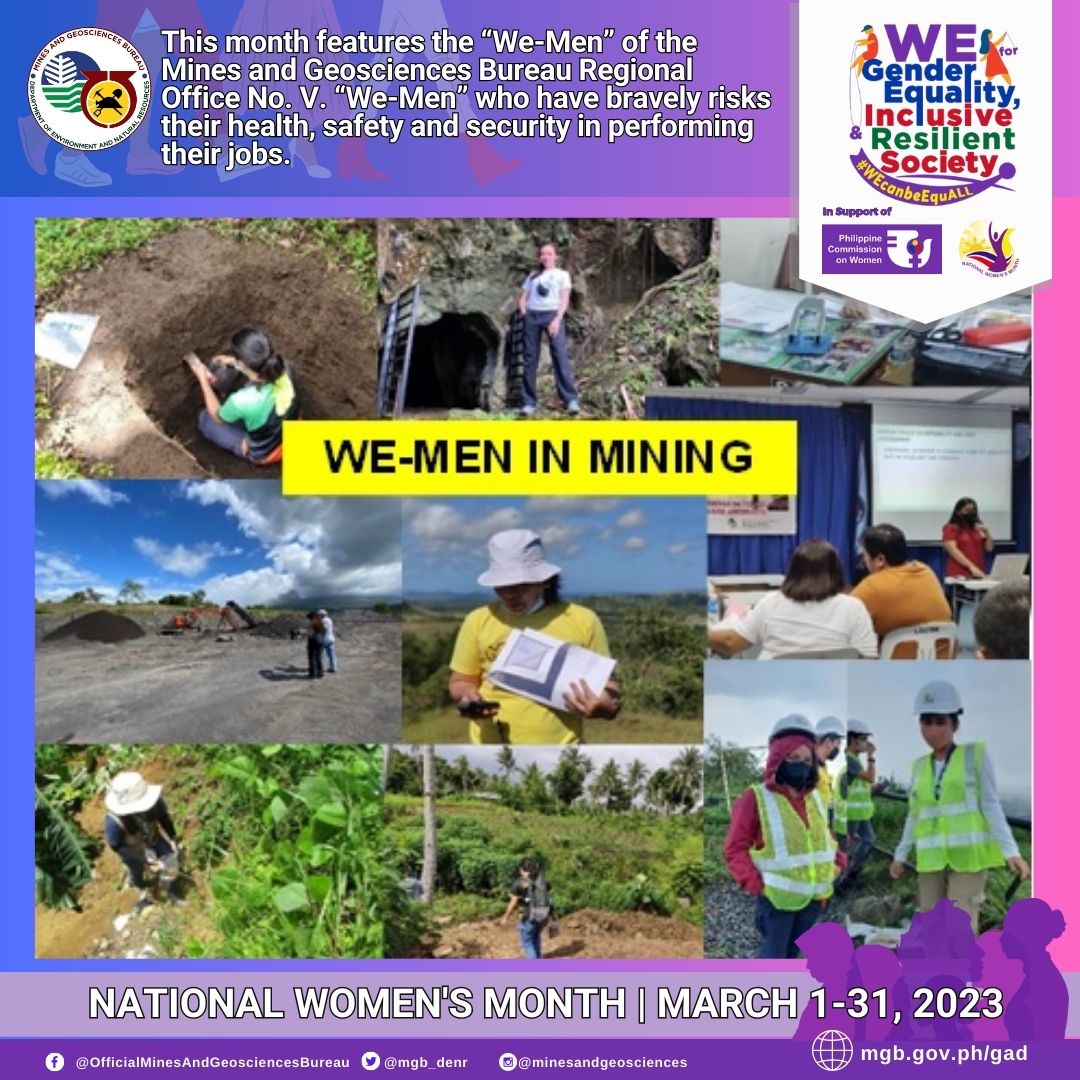
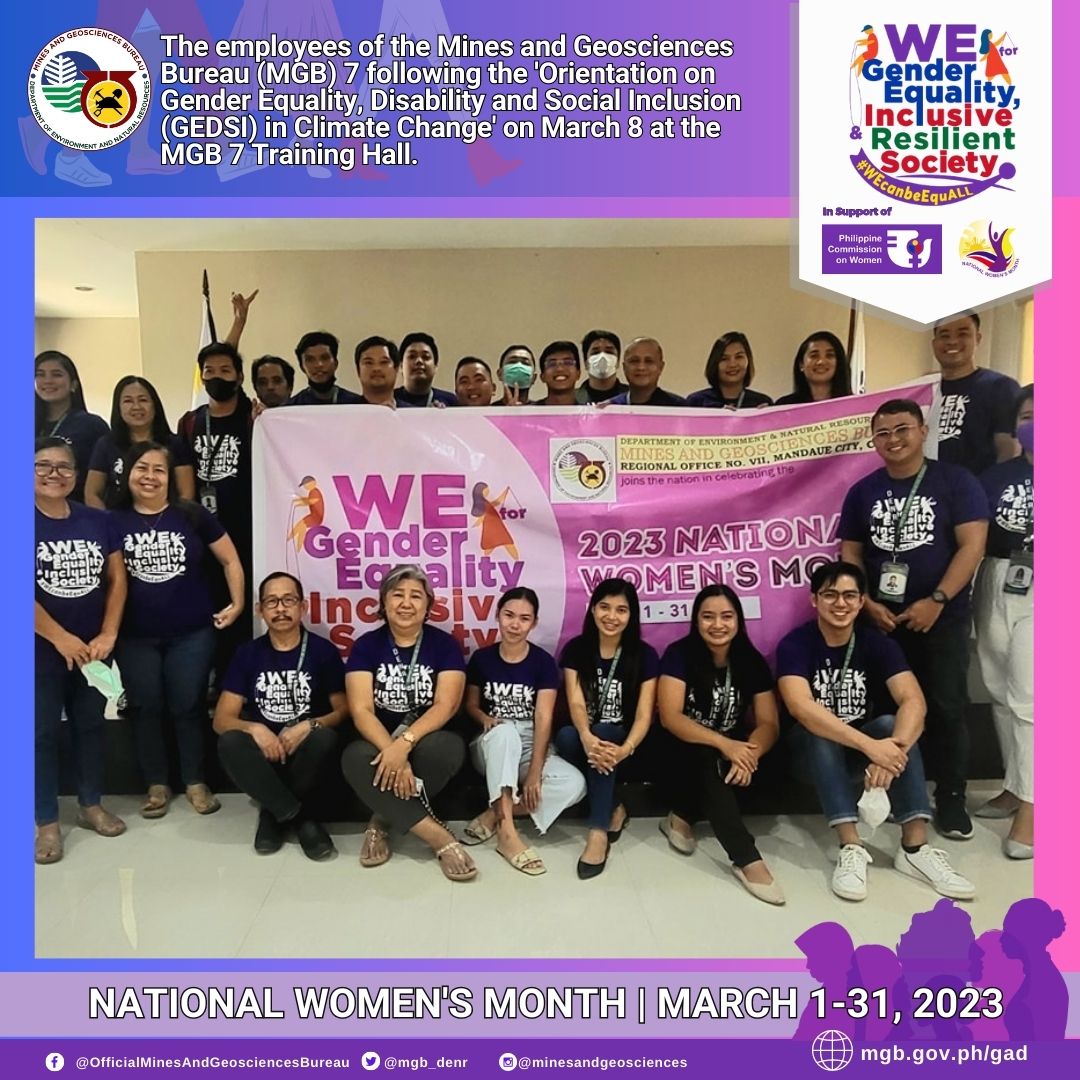
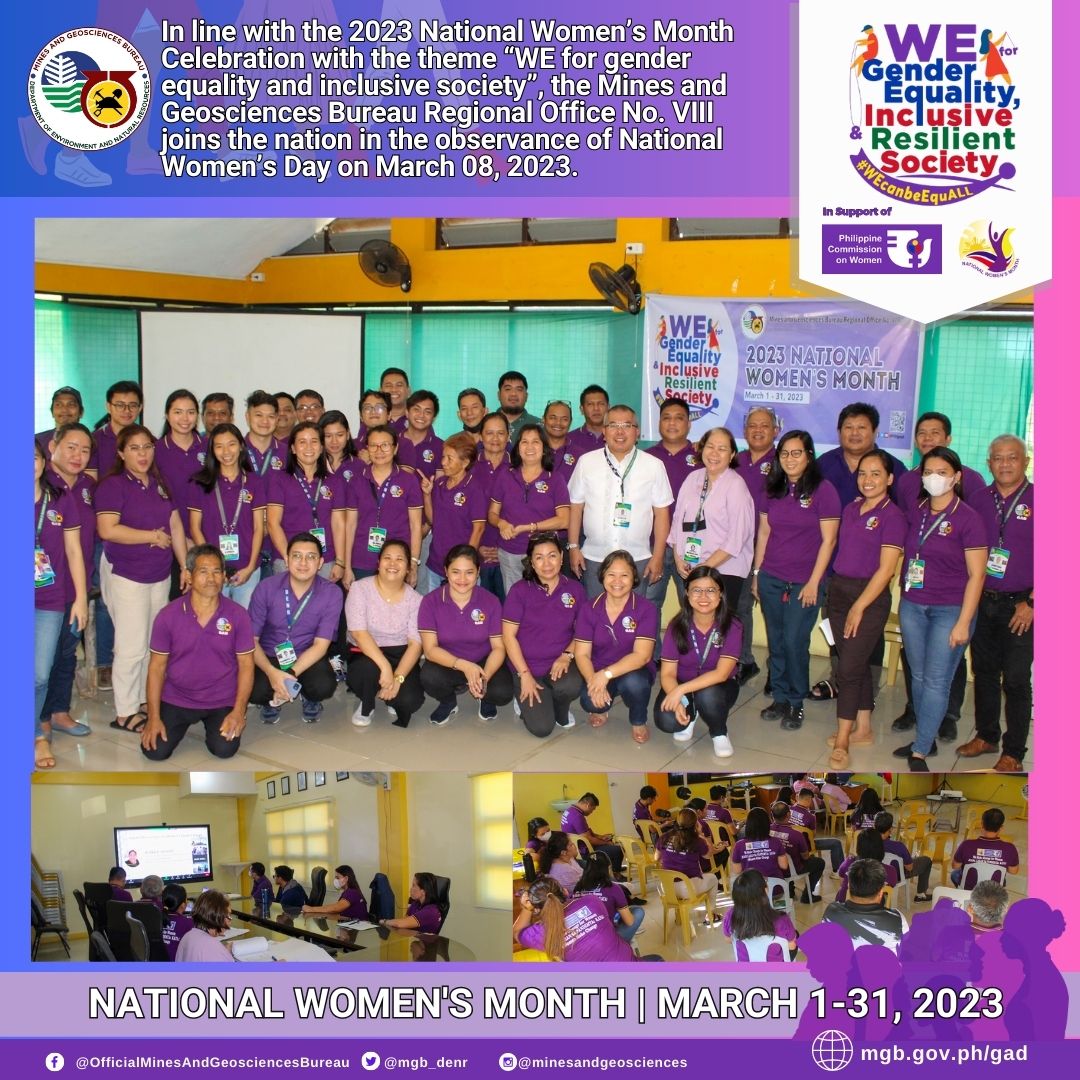
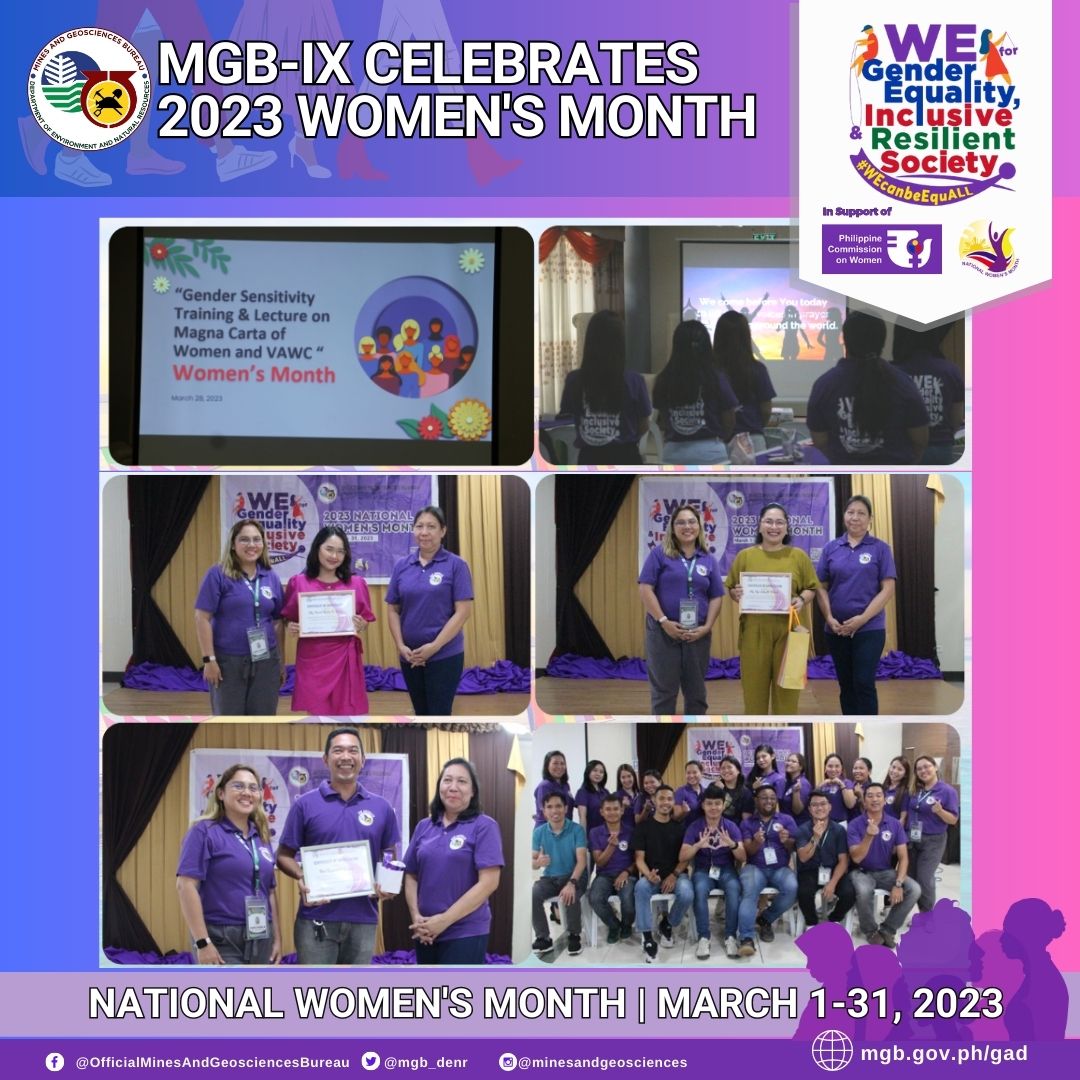
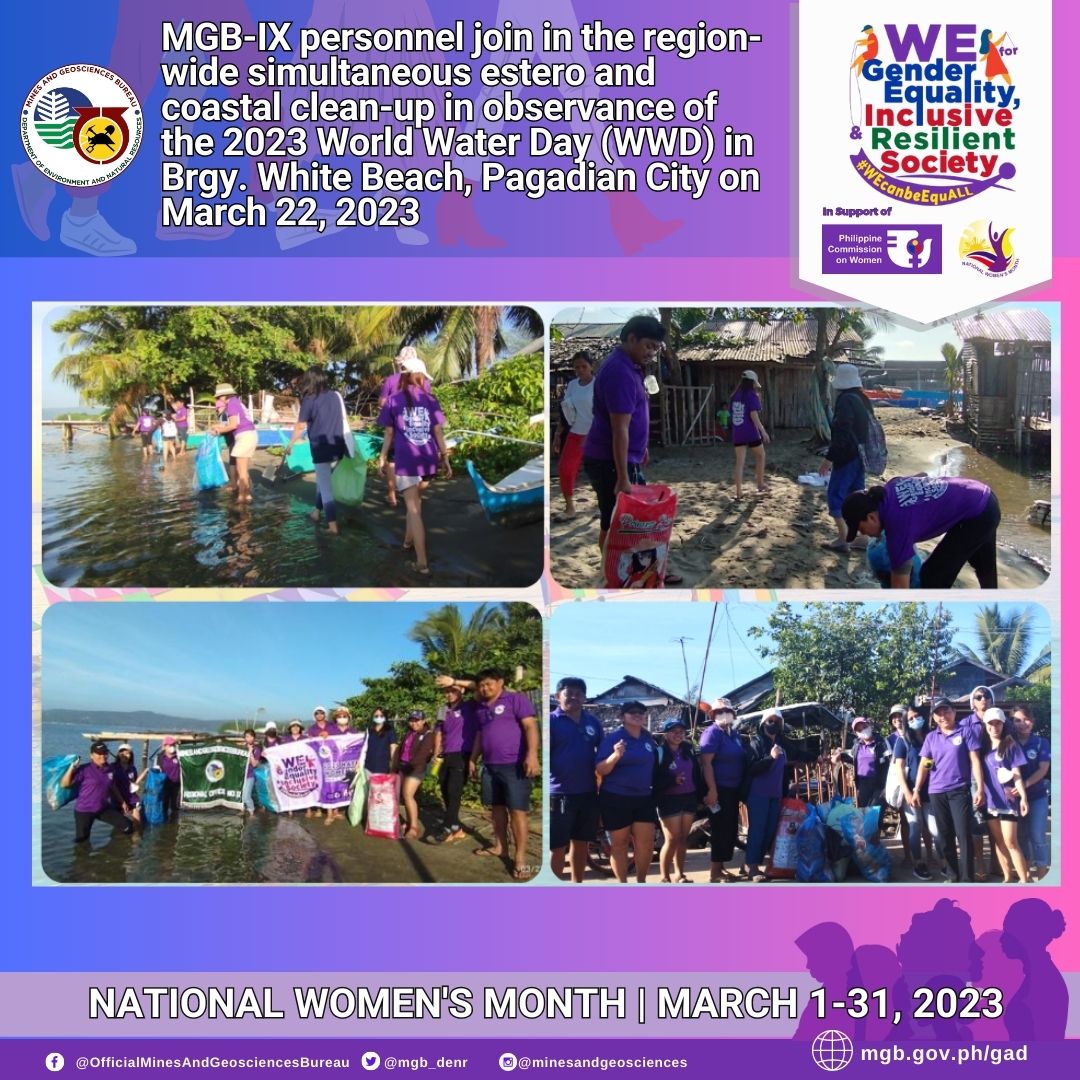
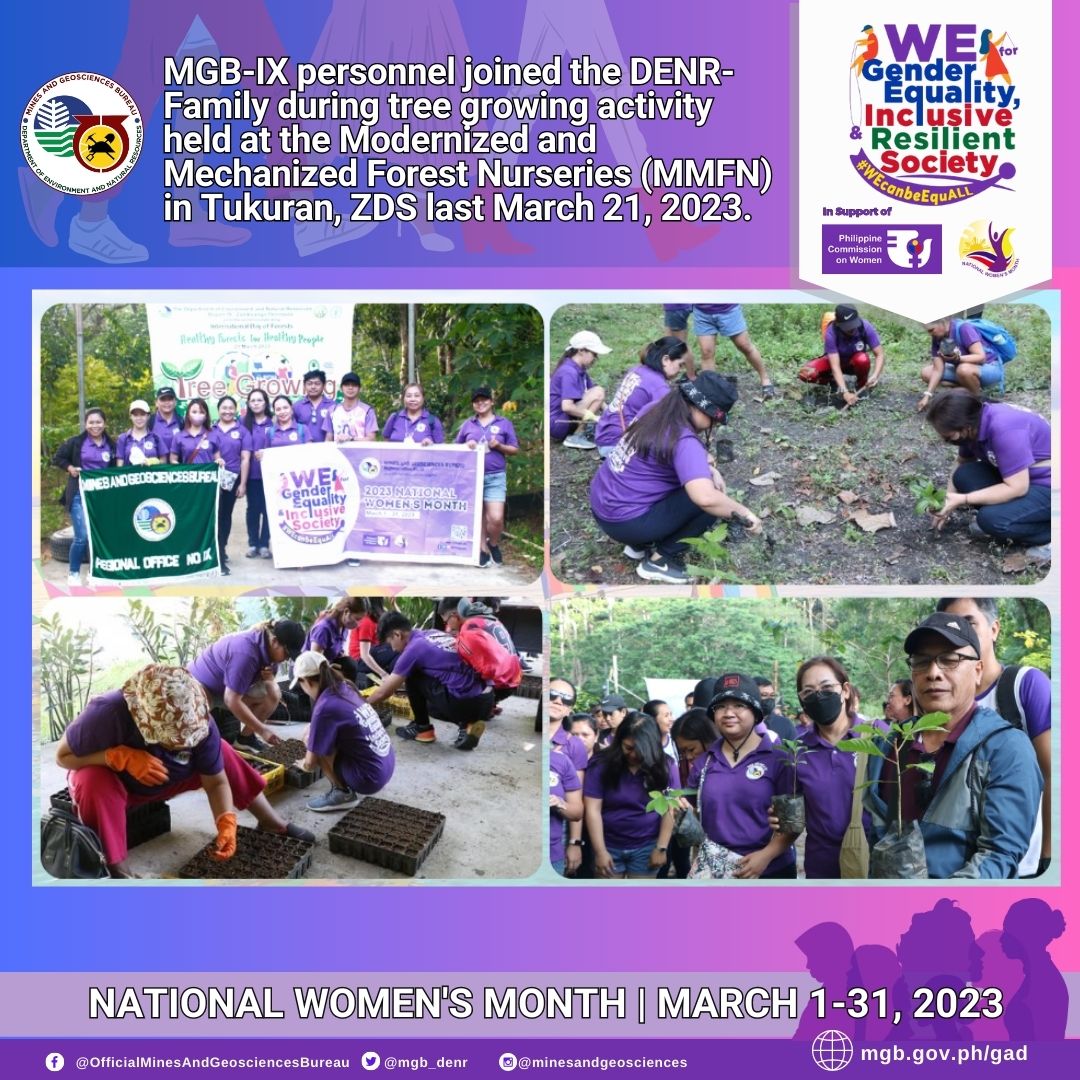
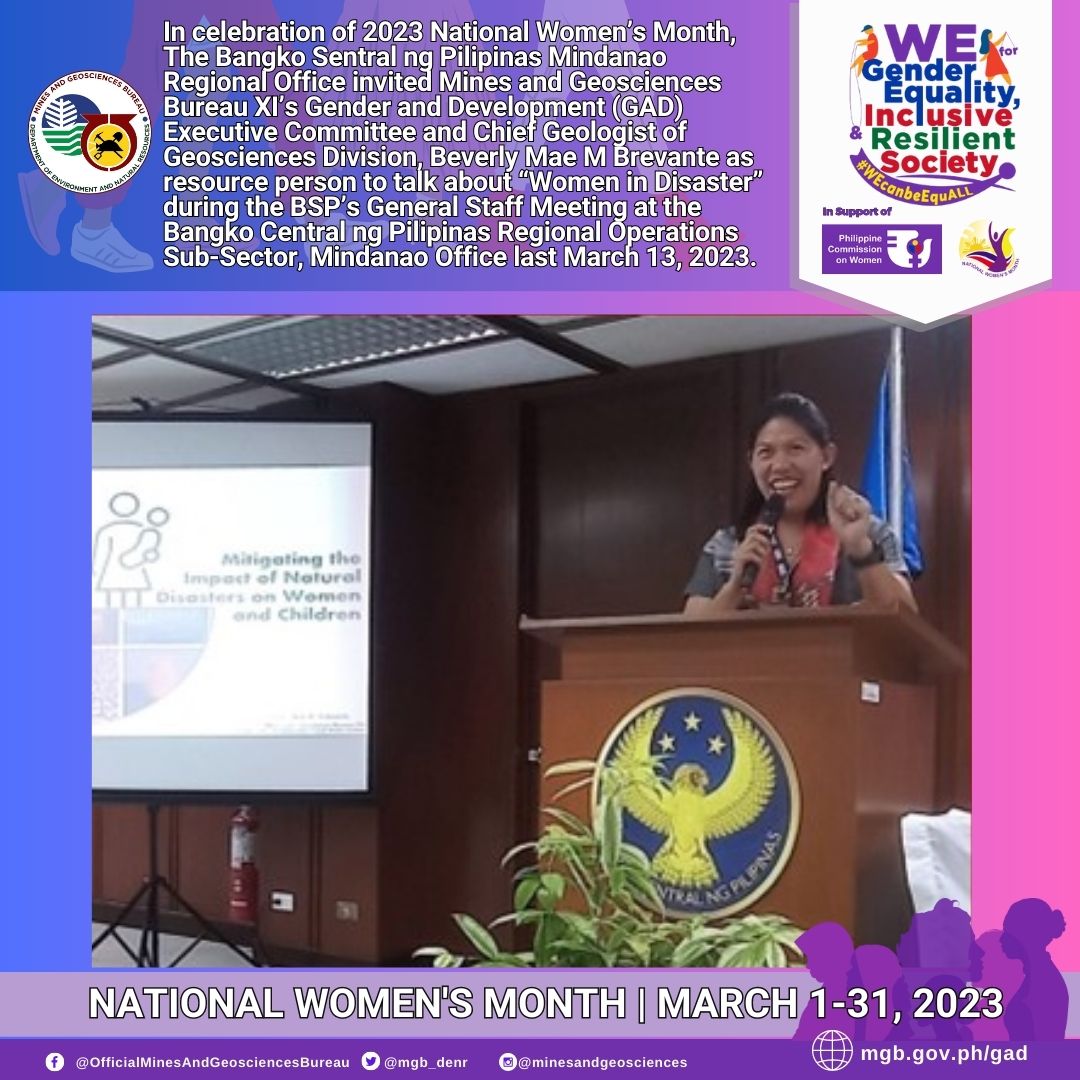
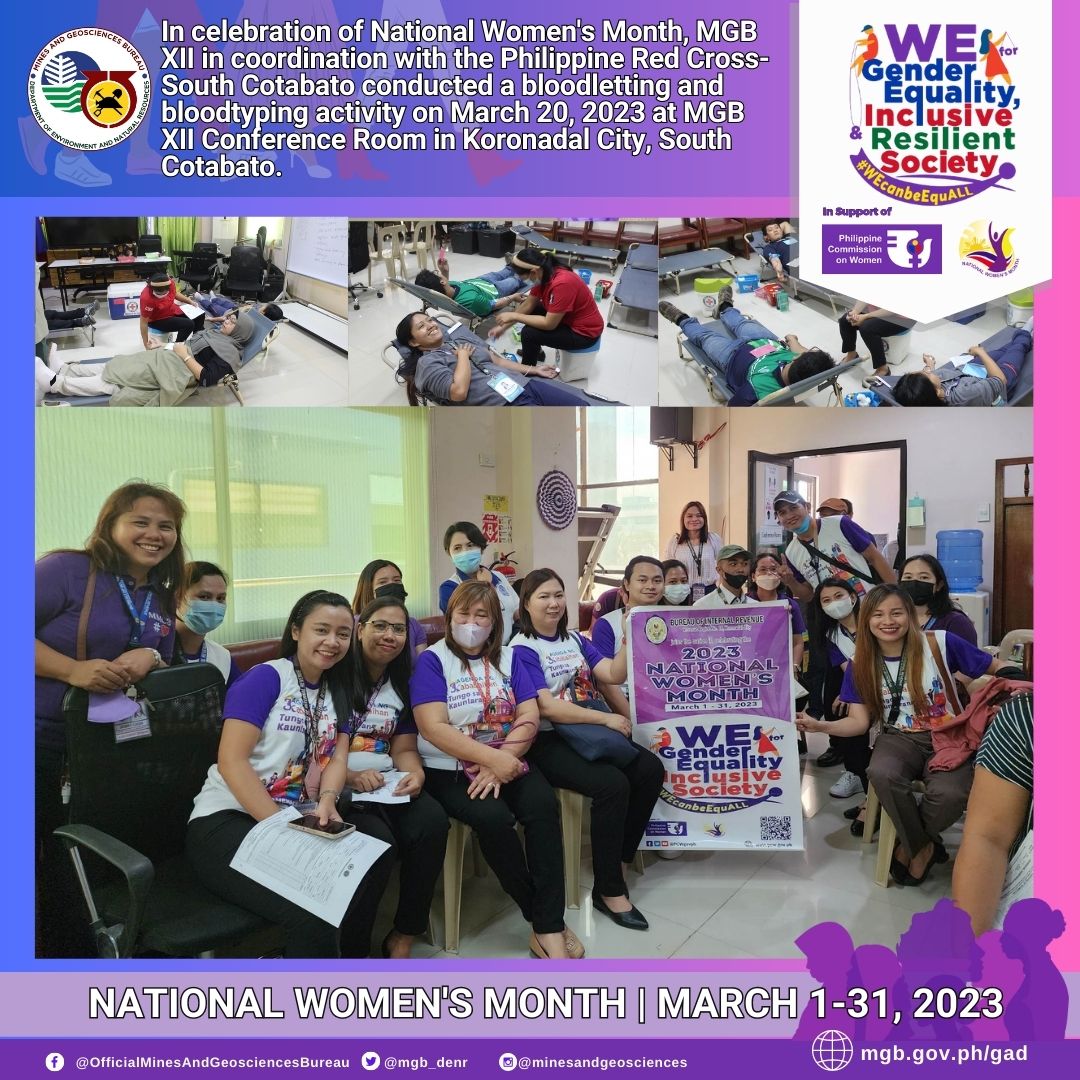
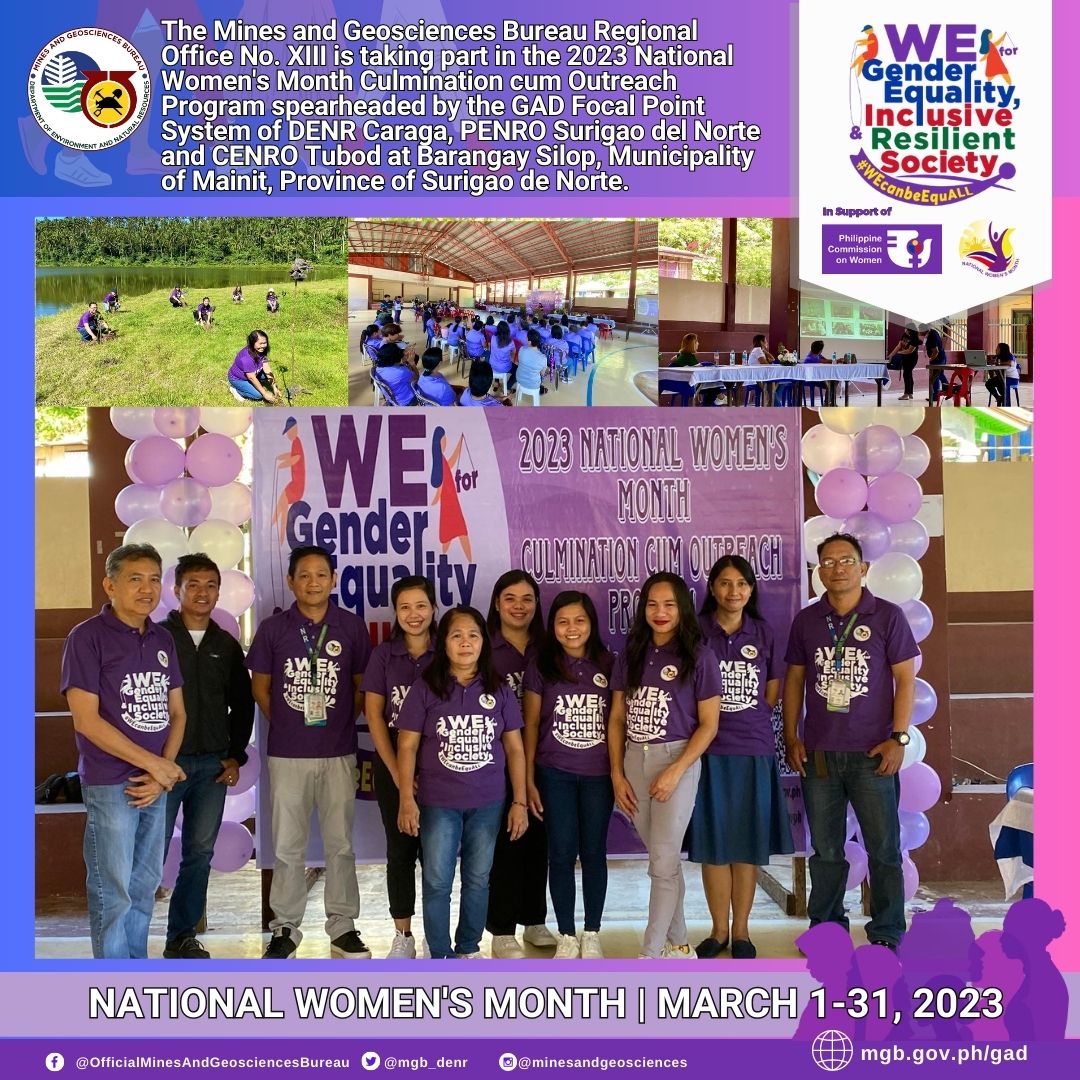
Other News
-
- PCW ties up with DENR to integrate gender-mainstreaming program
- MGB upholds advocacy on Gender and Development
- MGB for National Women's Month
- MGB Conducts Training Workshop on the Finalization of the MGB GAD Agenda for 2020-2025
- MGB Conducts Gender Sensitivity Workshop
- MGB practices use of gender-sensitive language
- MGB advocates gender equality thru enhanced GMEF
- MGB upholds advocacy on Gender and Development
- MGB employees undergo gender sensitivity training
- MGB Celebrates International Women's Month 2020
- MGB Joins the National Women's Month Celebration 2019
- MGB conducts workshop on on the Development of GAD Plan 2019 and Budget and GAD Accomplishment Report 2018
Program/Activities
| Gender Issue/GAD Mandate | Cause of the Gender Issue | GAD Result Statement/GAD Objective | GAD Activity |
| CLIENT-FOCUSED ACTIVITIES | |||
| Limited participation of Women Clients in MGB activities, programs and activities | Gender stereotyping of women in mining communities and their lack of exposure to MGB programs and activities | Build capacity of women in mining communities to participate in mining development | Conduct training for women in mining communities on mining laws, rules and regulations. |
| Limited participation of Women Clients in MGB activities, programs and activities | Lack of awareness on the geohazards program/project and the reading of geohazard maps | Increased women's awareness on the geohazards program/project and the reading of geohazard maps | Conduct of orientation-seminars for women's stakeholders on the geohazards program/project/activity and the reading of the geohazard maps |
| Proclamation of 1172 s. 2006 Declaring 25th of November to 12th Dec. of every year as the 18-Day Campaign to End Violence Against Women | Prevalence of violence against women | Increased awareness of clients, partners, and staff on VAW and related laws | Conduct of 18-Day Campaign Activities on VAW, internal seminars on VAW related laws, prayer session |
| Limited awareness of internal and external clients of gender issues, GAD activities and events | Requires easily accessible information, news developments and reports | Increased awareness of internal and external clients of GAD activities and events | Production of various IEC materials in GAD corners, websites and bulletine boards and IEC events (lectures, gender orientation) |
| ORGANIZATION-FOCUSED ACTIVITIES | |||
| Section 3.2 of PCW-NEDA-DBM Joint Circular 2012-01 mandates annual GAD Planning and Budgeting while Sec. 3.5 tasks GFPS to prepare Annual Accomplishment Reports | Need to institutionalize gender mainstreaming in MGB's program, projects and activities | To institutionalize gender mainstreaming in MGB's PAPs | Conduct of annual GAD planning, budgeting and preparation of accomplishment reports and training of the same |
| Pres. Proc. No. 224 declaring every 1st week of March of every year, March 8 of every year as Women's Day; Pres. Proc. No. 227 providing for the observation of the month of March as Women's Month | Need to continuously raise awareness on gender issues and concerns | To raise awareness on gender and women's issues and concerns and recognition of women's contribution to sustainable natural resource management | Conduct various activities; kick-off ceremonies, seminars, participation in inter-agency clebratory activities, film showing, production and dissemination of IEC materials |
| DENR DAO 25-002 of IRR of RA 7877 Section 4b call for creating a committee on decorum and investigation of cases on sexual harassment | Need for mechanism for cases of sexual harassment in the workplace | To strenghten functionality of CODI | Formulate guidelines for CODI operations |
| RA 10028 or the Expanded Breastfeeding Promotion Act of 2009, mandates the promotion of lactation | Women employees need support to perform their reproductive role while working | To provide lactating employees with approriate facility and support | Establish/maintain lactation stations with approriate facilities |
| PCW MC 2016-03 calls on the government agencies to use the enhanced GMEF in periodocally assessing level of gender mainstreaming in the organization | Regular assessment of gender mainstreaming needs to be institutionalized | To identify the strengths and weaknessses in mainstreaming gender in the organization and help raise GMEF rating of the organization | Participate on workshop-forum to apply enhanced GMEF and learning forum on the use of GMEF |
| PCW MC 2011-01 on Guideline for creation, strengthening and institutionalization of GAD Focal Point System | Need for continuous learning of GFPS | To raise capacity of GFPS to mainstream/implement GAD plans | Participation of GFPS members in training, seminars offered by PCW and other trainees |
| Section 4.4 of Joint NEDA-DBM-PCW MC 2012-01 calls for the institutionalizing collection of sex disaggregated data and gender information to inform policies, program/project planning and budgeting | Personnel information are not tarditionally sex-disaggregated | Updated SDD on MGB personnel | Collection of SDD on MGB Central and Regional Offices |
| Limited acquaintance, or appreciation and understanding of gender issues and concerns among employees of DENR/MGB | No basic orientation on gender, gender issues and concerns | To provide employees with basic orientation and training on gender, gender issues and concerns | Conduct gender sensitivity seminars and GAD orientation for employees |
| Inadequate staffing support for GAD work | GFPS have limited time for GAD activities | Staff support provided for implementation of GAD PAPs | Hiring of support staff for GAD work |
| Limited awareness among general MGB staff of various gender issues important in the workplace | Unconscious biases operating in the workplace | Improved understanding and acceptance of diverse genders and sexuality and gender fair language | Conduct of learning sessions on basic concepts of SOGIE and or gender fair language for technical staff |
| MGB employees on field work are exposed to risks and hazards that may be different for women and men | No documentation on the number of women and men employees exposure to risk and hazards in the fieldwork | Establish initial gender information on employees exposure to risks and hazards in fieldwork | Conduct of inventory of women and men employees in field work exposed to risks and hazards |
| Vulnerability of women employees and clients to sexual harassment | Traditions and cultures that discriminate against women, women employees and clients are often in subordinate positions in organizations | Draft policy on women undergoing fieldwork on sexual harrassment | No. of policy drafted |
Campaigns
National Women's Month
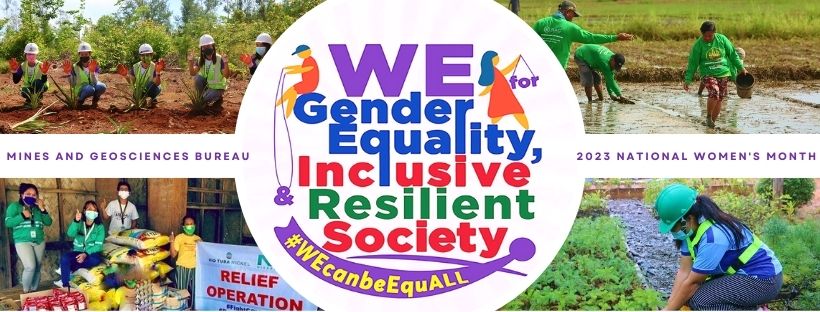
The Mines and Geosciences Bureau joins the nation in celebrating the 2023 National Women's Month with the recurring theme from this year to 2028: 𝙒𝙀 𝙛𝙤𝙧 𝙜𝙚𝙣𝙙𝙚𝙧 𝙚𝙦𝙪𝙖𝙡𝙞𝙩𝙮 𝙖𝙣𝙙 𝙞𝙣𝙘𝙡𝙪𝙨𝙞𝙫𝙚 𝙨𝙤𝙘𝙞𝙚𝙩𝙮.
The observance of International Women’s Day (IWD) was a result of the organizing activities of women in the early 20th Century. Between 1909 and 1911, working women in the United States of America participated in organizing strike activities of the National Women’s Trade Union League and other concerned groups. They were protesting against low wages, lack of protective legislation and the very poor working conditions to which women workers were subjected during that time.
The demonstrations were an offshoot of the tragic March 1911 Triangle Shirtwaist Factory fire in New York City, which took the lives of more than 140 working girls, mostly Italian and Jewish immigrants. Subsequently, the inhumane working conditions and other unfair labor practices leading up to the disaster were invoked during observances of IWD.
In Europe, Clara Zetkin and the Socialist Women’s International demanded that March 8th be International Women’s Day, celebrated each year to recognize working women around the world. The celebration of IWD has since stimulated major historical events. For instance, IWD was the inspiration for the general strike, which began the Russian Revolution in St. Petersburg in 1917 when 10, 000 women textile workers demonstrated.
It is due to such a history of women organizing around the world that IWD was officially recognized by the United Nations to celebrate women’s contributions to all societies.
In the Philippines, the Women’s Month Celebration has since served as a venue to highlight women’s achievements and discuss continuing and emerging women’s empowerment and gender equality issues and concerns, challenges, and commitments. The celebration focuses on concrete activities that are aligned with national and international instruments and treaties such as the Convention on the Elimination of All Forms of Discrimination Against Women, the Beijing Platform for Action, the Philippine Plan for Gender-Responsive Development (1995-2025), the Framework Plan for Women, and the Sustainable Development Goals.
Legal Mandates
The passage of the following laws serves as the legal bases for the celebration of National Women’s Month:
Proclamation No. 224 s. 1988, “Declaring the First Week of March of Every Year as Women’s Week and March 8, 1988, and Every Year Thereafter as Women’s Rights and International Peace Day.” Signed by former President Corazon C. Aquino on March 1, 1988, it affirmed our solidarity with the United Nations and recognized Filipino women’s contribution to the struggle for national independence, civil liberties, equality, and human rights.
Proclamation No, 227 s. 1988, “Providing for the observance of the Month of March as ‘Women’s Role in History Month’” Signed by President Aquino on March 17, 1988, reinforced the earlier proclamation by emphasizing the role of Filipino women in the social, cultural, economic and political development throughout our history. It provided for a month-long nationwide observance with appropriate ceremonies and activities to be spearheaded by the Commission.
R.A. 6949 s. 1990, “An Act to Declare March Eight of Every Year as a Working Special Holiday to be Known as National Women’s Day” was signed by President Aquino on April 10, 1990. The law further strengthened the impetus for the celebration by declaring every March 8 as a special working holiday and enjoining employees from the government and private sector to participate in activities conducted by their offices.
2023-2028 Theme
The 2023 National Women’s Month Celebration marks a juncture in the advancement of women’s rights as it launches a new recurring theme from this year to 2028: WE for gender equality and inclusive society. It sparks a renewed commitment to the advocacy and banks on the gains achieved during the 2016-2022 theme, WE Make CHANGE Work for Women, which emphasized the need for compassionate and harmonized networks towards gender equality and women’s empowerment (GEWE).
The recurring theme also aligns with the Philippine Development Plan 2023-2028, which aims for “deep economic and social transformation to reinvigorate job creation and accelerate poverty reduction by steering the economy back on a high-growth path.” The plan also highlights that growth must be inclusive, building an environment that provides equal opportunities to all Filipinos and equipping them with skills to participate fully in an innovative and globally competitive economy.
We begin this new era of the National Women’s Month Celebration with the hope and ambition that WE are all for Gender Equality, WE are all for an inclusive society.
Elements of the Theme
WE stands for Women and Everyone emphasizing the role of women themselves and everyone in the pursuit of gender equality. WE also stands for Women’s Empowerment, which can only be achieved when agencies, mechanisms, institutions, private partners, and duty-bearers from the national to the local level provide women equal rights and opportunities, and women take these opportunities to further themselves. With women and everyone in synergy, WE can make gender equality a possibility.
Gender Equality. Gender equality is the first half of the GEWE advocacy, and it is the ultimate goal when we advance the rights of women. Thus, the theme bearing this is a call for urgent action to double the efforts toward this absolute aspiration. In the Global Gender Gap Report, at the current rate of progress, with the global gender gap being closed by only 68.1%, it will take 132 years to reach gender equality worldwide, a stark difference from the figure of 99.5 years in the 2020 report. Hence, this means that none of us, or most likely many of our children, will see gender parity in our lifetimes. But not all hope is gone because our right for gender equality today is for a better and more inclusive tomorrow, albeit not in the next generations.
The term gender equality is also preceded by the word “for”, signifying our call to women and everyone to vote for, take action on, and promote equality and inclusivity.
Inclusive society. This is a call not only for a gender-responsive society but an inclusive one. A society that overrides differences in SOGIE, class, ability, generation, status, and culture; a society where every individual, each with rights and responsibilities, has an active role to play. Equality and inclusion go hand-in-hand in the GEWE advocacy.

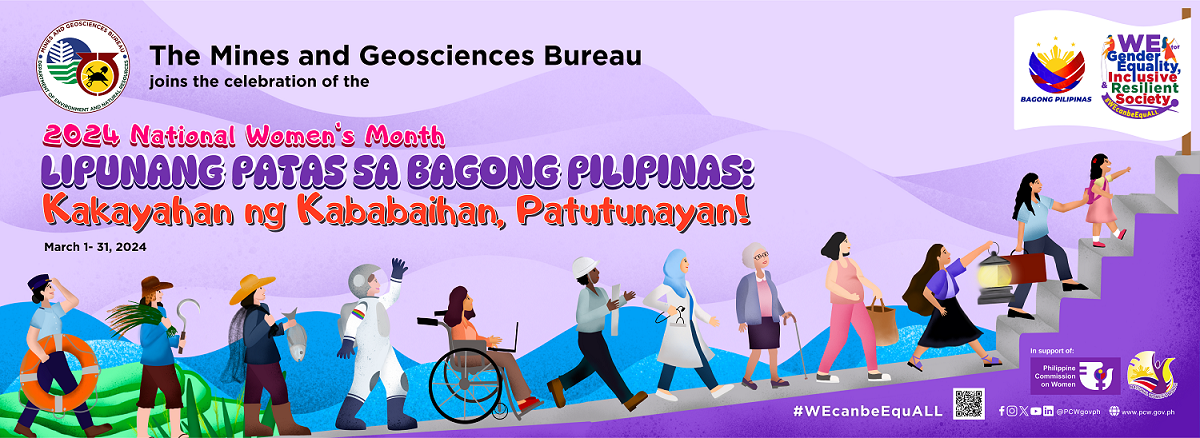
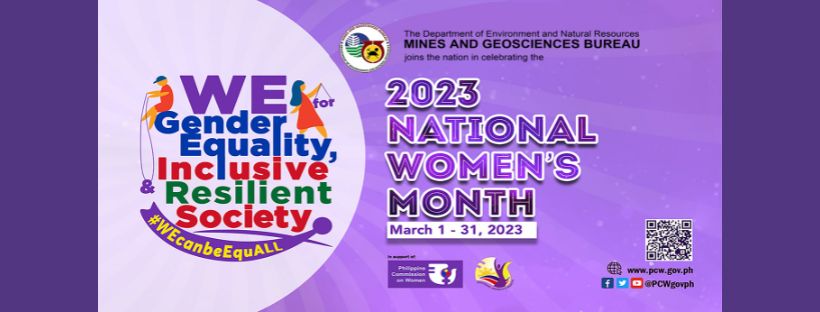
VAW Free PH
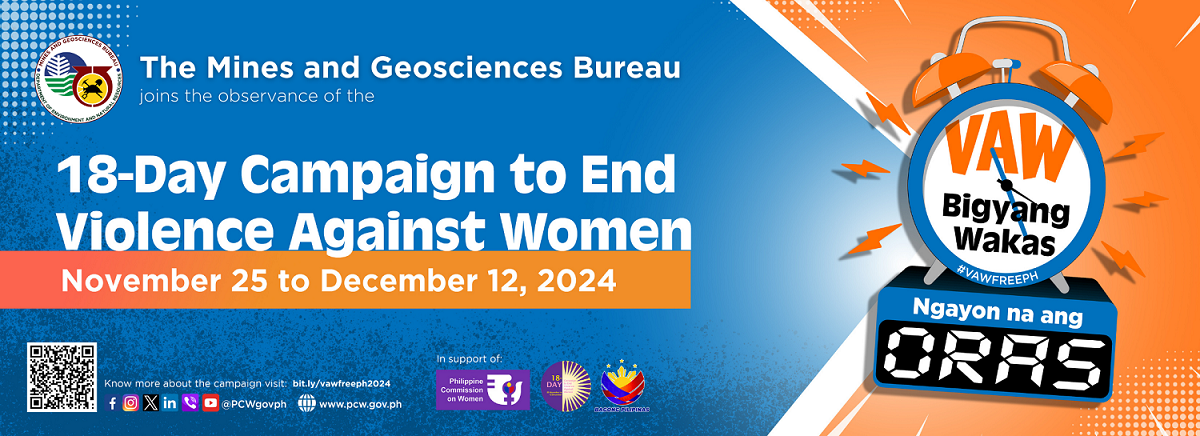
Advocacy Videos
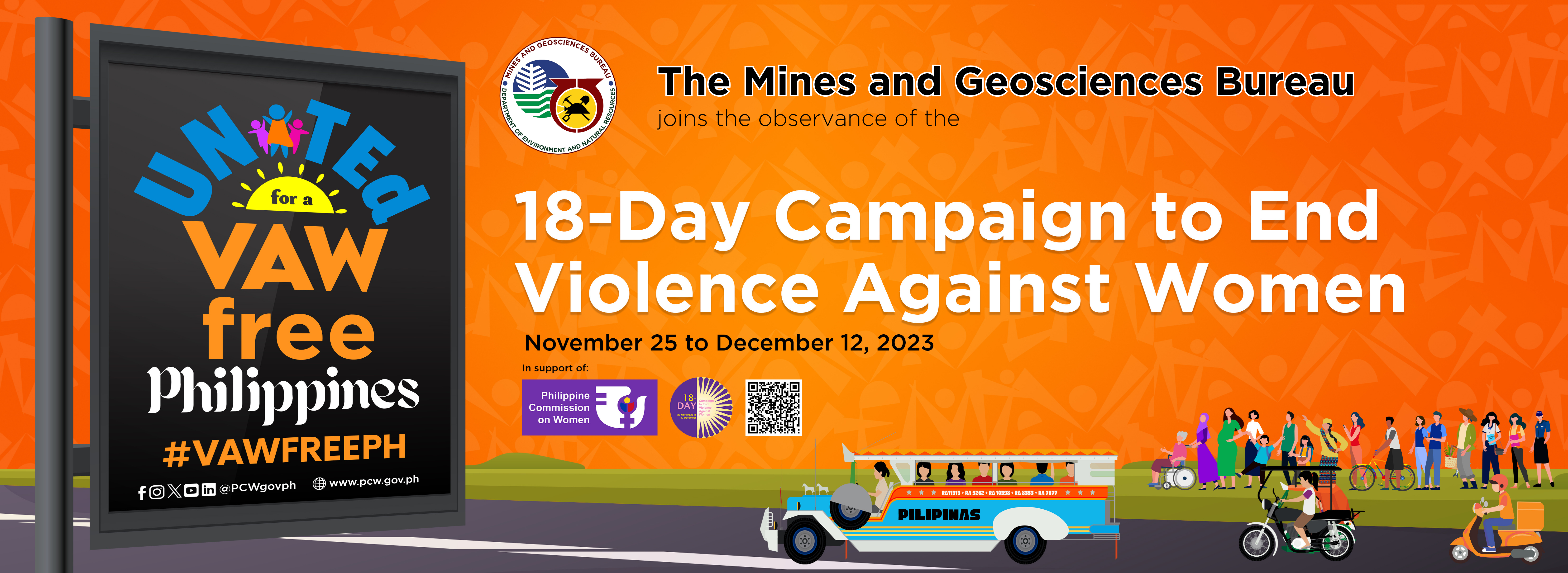
Orange Your Icon Advocacy Initiative
#OrangeYourIcon is an initiative aimed at sparking the public’s curiosity. It urges government offices and private organizations nationwide to color its major landmarks or iconic spots orange during the campaign period. It will also allow advocates to introduce and explain their advocacy to others.
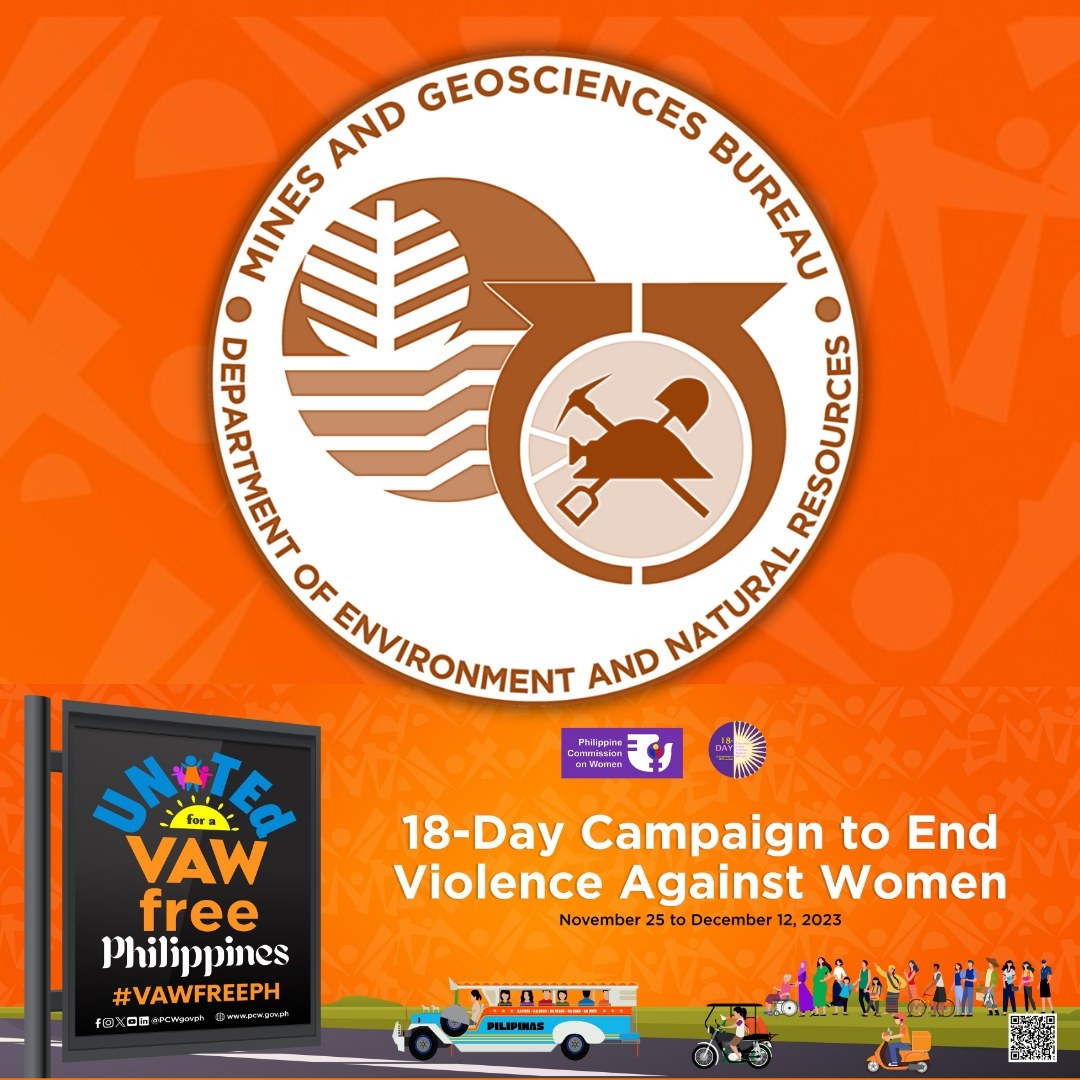
Our stories should always begin with respect and end with respect.
Let's never tolerate violence; speak up and stand against VAW!
Let's stand UNiTEd for a VAW-free Philippines!
Join the advocacy now! Kindly visit the campaign webpage (https://pcw.gov.ph/2023-18-day-campaign-to-end-violence.../) to learn more about this year’s campaign focus and objectives, suggested activities, branding guidelines, and advocacies.
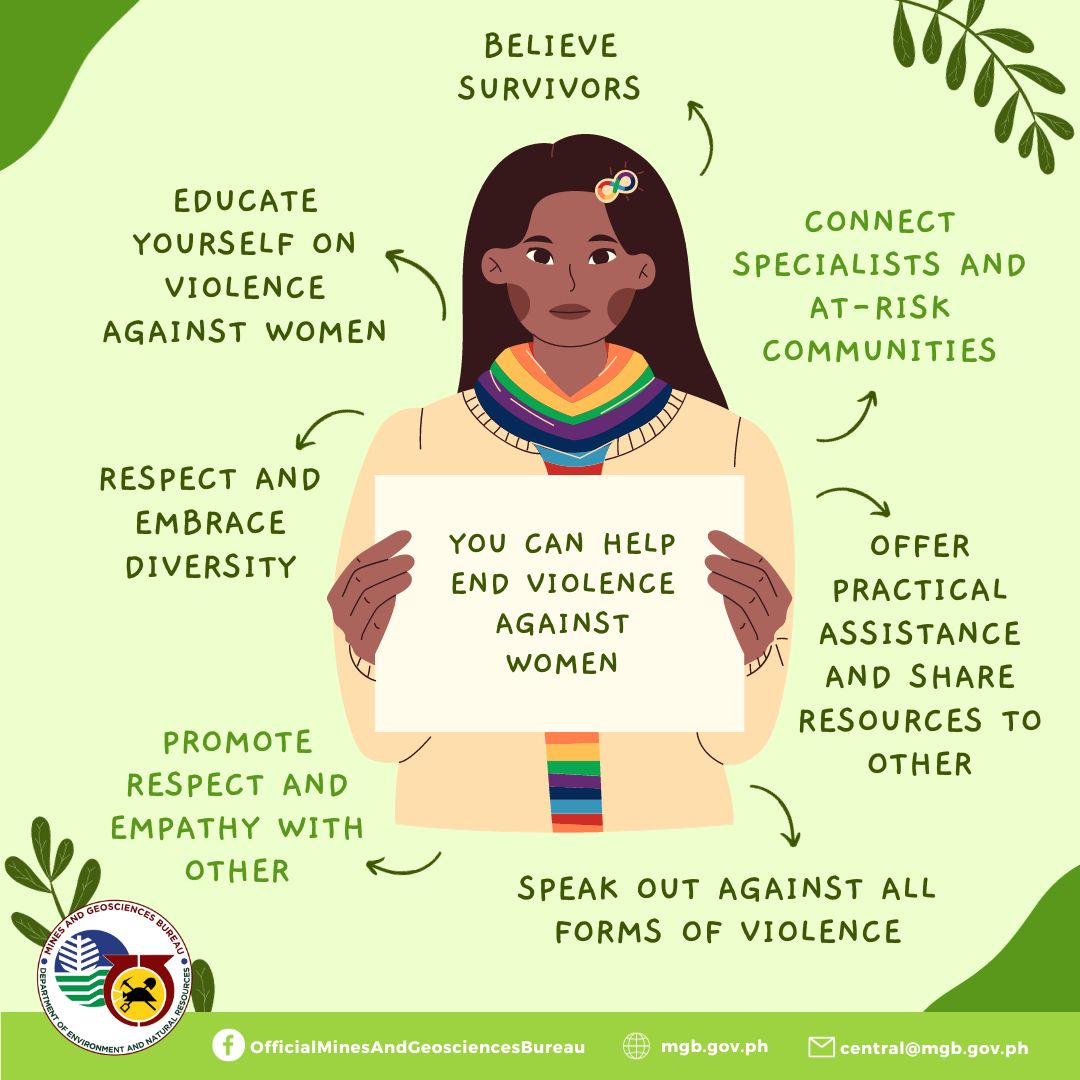
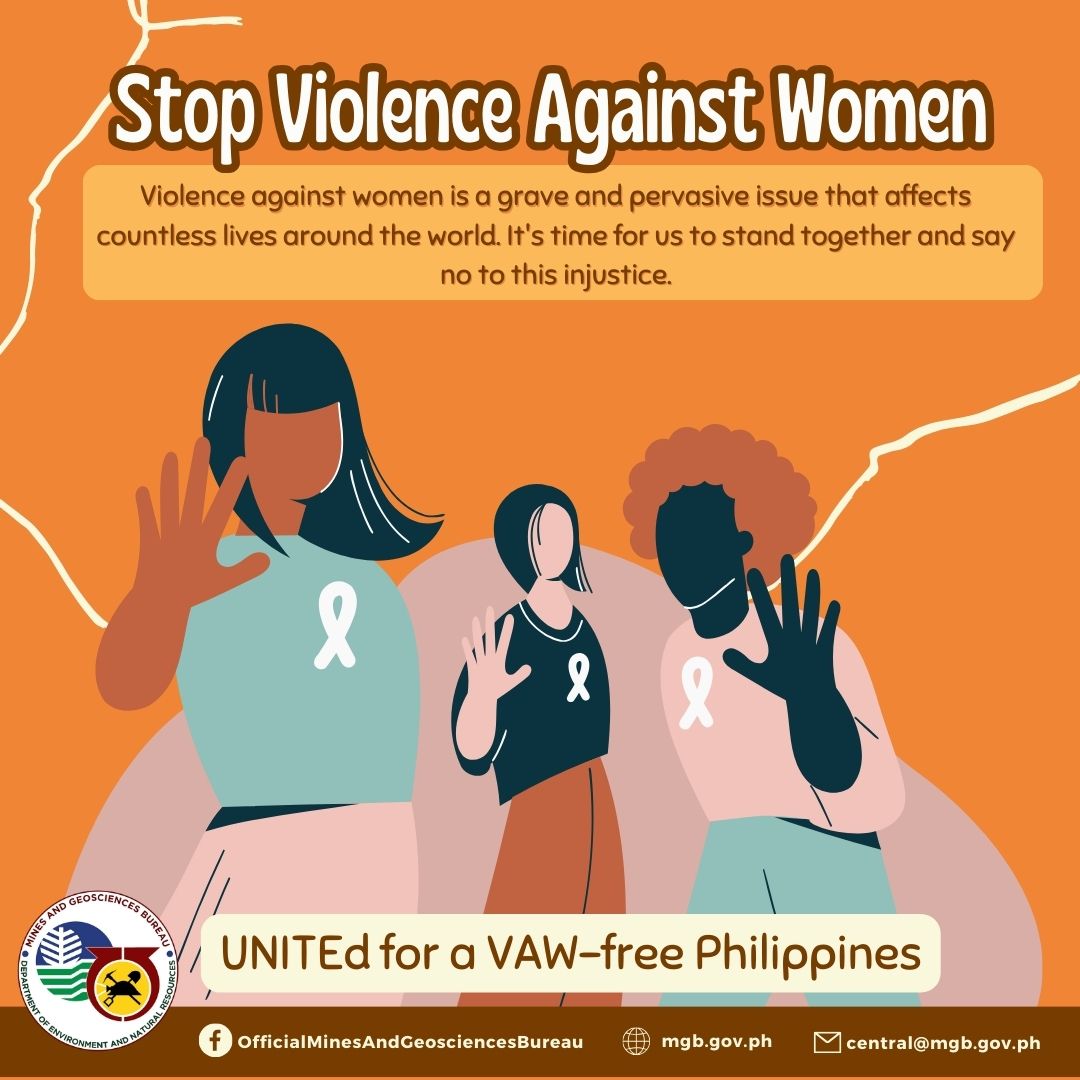
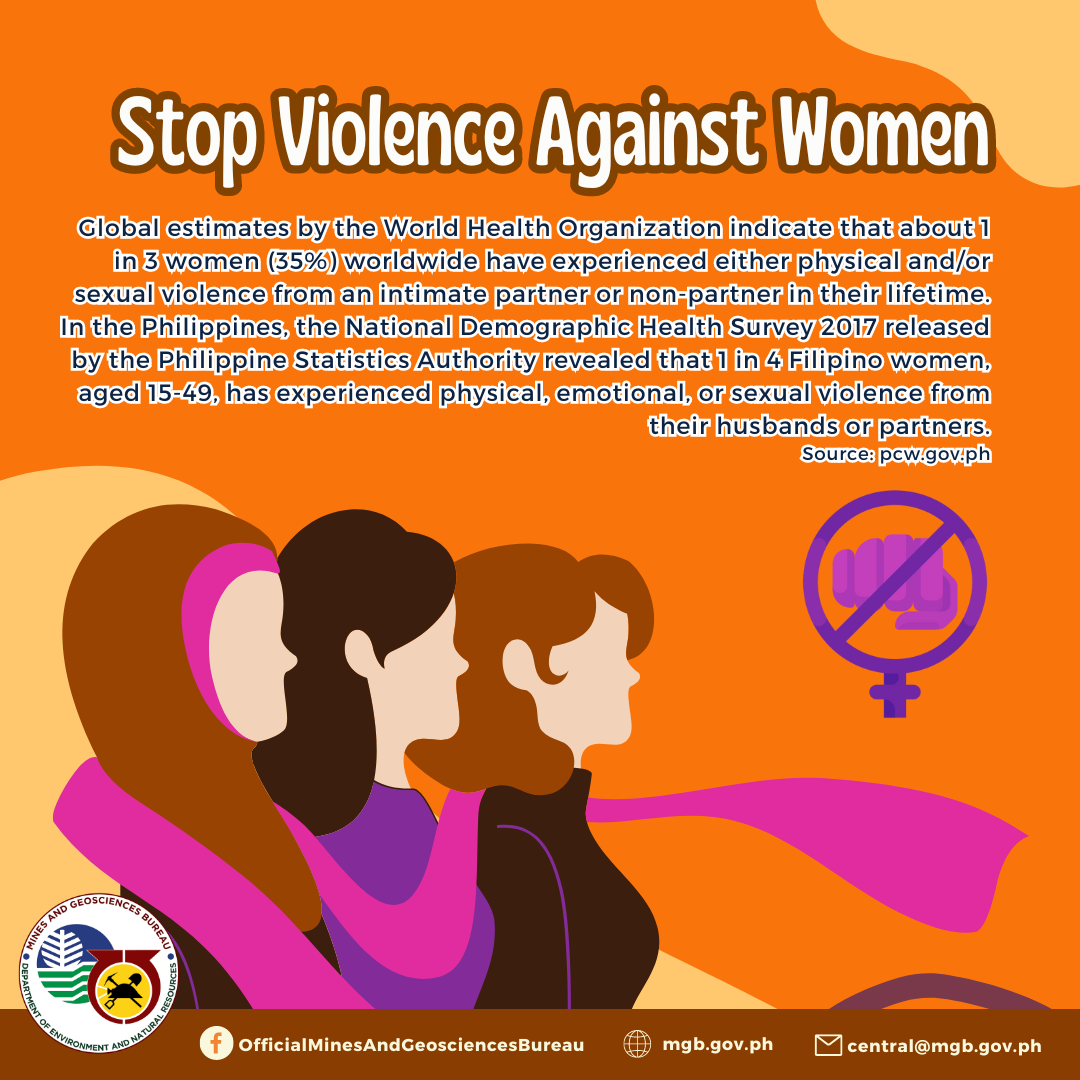
Campaign Background
According to the 2023 Global Gender Gap Index Report by the World Economic Forum, the Philippines continues to lead as the most gender-equal country in Asia, with a 79.1 percent gender parity, and is ranked 16th out of 146 countries worldwide. However, it is essential to acknowledge that violence against women (VAW) and girls persists in the country in various forms. This pressing reality reinforces the collective responsibility of every Juan and Juana to take a dedicated stance against VAW. This concerted effort aims to pave the way toward a VAW-free Philippines.
Defined by the United Nations as “any act of gender-based violence that results in, or is likely to result in, physical, sexual, or mental harm or suffering to women, including threats of such acts, coercion or arbitrary deprivation of liberty, whether occurring in public or in private life,” VAW remains a pervasive social dilemma that violates women’s rights and fundamental freedoms up to this day.
In the Philippines alone, 18 percent of women (1 in 5) aged 15-49 have experienced any form of physical, sexual, or emotional violence by their current or most recent husband/intimate partner, as reported on the 2022 Philippine National Demographic Health Survey (NDHS) released by the Philippine Statistics Authority. Globally, 30 percent of women (about 1 in 3) have been subjected to either physical and/or sexual intimate partner violence or non-partner sexual violence in their lifetime, as indicated by estimates published by the World Health Organization.
In summary, VAW is considered a major public health problem as it:
1) affects a woman’s attitudes, behaviors, and sense of self;
2) limits her potential, growth, and personal development;
3) jeopardizes her health, safety, and welfare, and;
4) impacts not only her family but even her community.
Nonetheless, with the united efforts of the government and the citizenry, VAW can be prevented and eventually stopped from happening.
Campaign Theme
To continuously advocate for the prevention and elimination of VAW in the country, the Philippine Commission on Women (PCW) is calling for solidarity among every Juan and Juana as it leads the annual 18-day Campaign to End VAW with the 2022-2027 recurring campaign theme, “UNITEd for a VAW-free Philippines.”
This campaign theme is aligned with the “UNITE by 2030 to End Violence Against Women” initiative of the UN Women, a multi-year effort to prevent and eliminate violence against women and girls worldwide. Launched in 2008, the UNITE initiative supports the global “16 Days of Activism Against Gender-Based Violence” campaign worldwide and runs from November 25 to December 10 every year. November 25 is the International Day to Eliminate VAW and the country’s National Consciousness Day for the Elimination of VAWC by virtue of Republic Act 10398, while December 10 is declared International Human Rights Day.
The Philippine government began joining the global campaign in 2002 as intensive lobbying for policies and setting up mechanisms were conducted to address human trafficking and violence against women. Subsequently, in 2006, then President Gloria Macapagal-Arroyo signed Proclamation 1172 to extend the national campaign to 18 days until December 12, coinciding with the observance of the International Day Against Trafficking.
The date marks the adoption of the “Protocol To Prevent, Suppress and Punish Trafficking in Persons, especially Women, and Children“ in Palermo, Italy, in 2000. Hence, November 25 to December 12 of every year is now declared as the “18-day Campaign to End VAW” in the Philippines to address all forms of VAW and strengthen the government’s goal to protect the human rights of women as enshrined in the 1987 Constitution, other laws, the Framework Plan for Women, other policies and programs, and the Convention on the Elimination of All Forms of Discrimination Against Women.
Campaign Objectives
The 2023 campaign aims to:
-
- revisit the amendments and provide the public with updated information on laws protecting women and girls, specifically the Anti-Violence Against Women and their Children Act of 2004 (RA 9262), The Anti-Rape Law (RA 8353 as amended by RA 11648), Safe Spaces Act (RA 11313), Anti-Sexual Harassment Act of 1995 (RA 7877), and Expanded Anti-Trafficking in Persons Act of 2022 (RA 9208 as amended by RA 11862);
- aid in disseminating information about the status of VAW in the Philippines and the results of the 2022 National Demographic and Health Survey data on VAW; and
- gather public support for the advocacy and solicit shared insights on their level of awareness and knowledge on VAW.
Campaign Activities
The PCW, in partnership with key stakeholders, will be conducting the following activities in support of the 2023 18-day Campaign to End VAW:
Online Campaign Launch
-
- The use of the #VAWfreePH and #VowToEndVAW to sustain the momentum of the previous years’ advocacy towards a VAW-free community.
- Showing of the PCW street interviews called “Alam Mo VAW?” to introduce VAW-related laws that will be tackled during the campaign period. This street interview endeavors to get a glimpse of the awareness and knowledge of the public on VAW-related laws such as RA 9262, RA 8353 as amended by RA 11648, RA 11313, RA 7877, and RA 9208 as amended by RA 11862.
“VAWck to Basics” Series
This online series aims to inform the public about the basics and updates on the 18-day Campaign and VAW-related laws. A dedicated number of days will be allotted to specific topics to equally emphasize all the vital information about VAW.
| DAY 1 to 3 All About the 18-day Campaign |
November 25-27, 2023 | – Content about the campaign in general – Online showing “Alam Mo VAW?” Street Interviews |
| DAY 4 to 8 Anti-VAWC Act of 2004 |
November 28-December 01, 2023 | – Anti-VAWC Act through the years – Cases on VAWC in PH – Other content relevant to the Anti-VAW Campaign – Short video graphics about the RA 9262 |
| DAY 9 to 12 The Anti-Rape Law of 1997 |
December 02-05, 2023 | – All about RA 8353 as amended by RA 11648 – Short video graphics about RA 8353 as amended by RA 11648 |
| DAY 13 to 15 Safe Spaces Act and Anti-Sexual Harassment Act of 1995 |
December 06-09, 2023 | – All about RA 11313 – All about RA 7877 – Short video graphics about RAs 11313 and 7877 |
| DAY 16 to 18 Expanded Anti-Trafficking in Persons (TIP) Act of 2022 |
December 10-12, 2023 | – All about RA 9208 as amended by RA 11862 – Short video graphics about the Anti-TIP Law |
“Bawat Pilipino para sa VAW-free Pilipinas”
This is an onsite program in collaboration with the Inter-Agency Council on Violence Against Women and their Children (IACVAWC) that will be held on November 28, 2023. It aims to gather insights and pledges from duty-bearers and spotlight the means and ways to strengthen the enabling environment for VAW prevention in the country. It will also serve as a venue to (1) preview the public’s awareness on VAW-related laws and their reactions to VAW-related situations through the showing of the VAW Social Experiment and “Alam Mo VAW?” Street Interviews and (2) to launch the IACVAWC website.
VAWfreePH
This will be the official 18-day campaign hashtag to sustain the drive towards a VAW-free Philippines. GADvocates and the public are encouraged to participate in the online campaign and can use this hashtag on their online posts to signify their support for the advocacy.
VowToEndVAW Commitment Campaign
Every Juan and Juana who wants to make a vow against VAW is encouraged to post their photos online, posing with the “Stop VAW” sign and indicating in the caption their thoughts and suggestions on how to achieve a VAW-free Philippines under the hashtag #VowToEndVAW.
Ano VAW? Anti-VAWlitaktakan Online Program
This online program features the VAW social experiment with respective resource speakers. It intends to directly engage with the public and gather their reactions, insights, and level of awareness on VAW-related laws through comments and calls. The program will be live via the PCW Facebook page and //www.youtube.com/@PCWgovph" style="box-sizing: inherit; color: rgb(101, 20, 162); text-decoration: none; background-color: transparent; line-height: inherit; cursor: pointer; transition: all 0.2s ease 0s;">YouTube channel on December 5 and 12, 2023.
Other Events
Everyone has the right to live in equality and dignity. Ensuring the equal opportunities for individuals with disabilities is not only a legal but also a moral commitment to uphold their rights.
Let us pledge to make the world more inclusive and accessible for people who live with pain and other impairments on this #InternationalDayOfPersonsWithDisabilities. Any action, no matter how tiny, brings us one step closer to a society in which every individual may fully participate and be acknowledged for their efforts, regardless of ability.
Come along on our endeavor. We can build an inclusive and diverse world if we work together.
